#to be fair if i was next to billie piper
Text
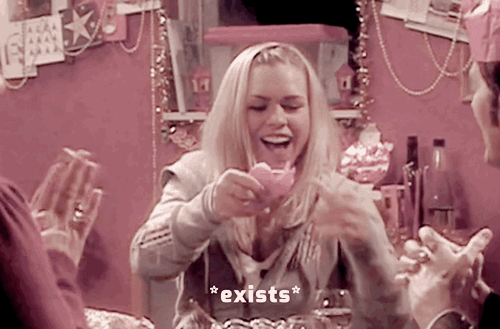
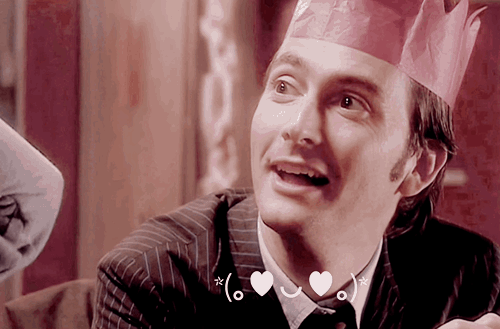
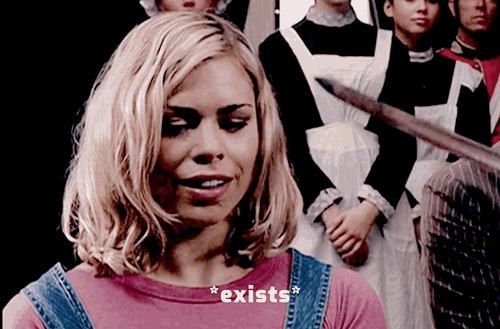
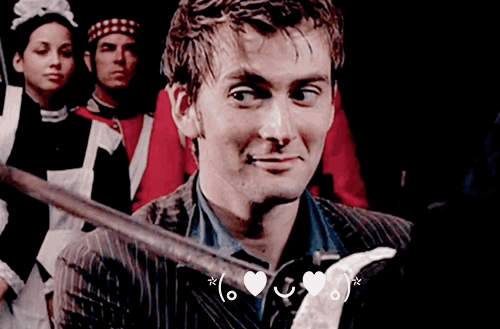
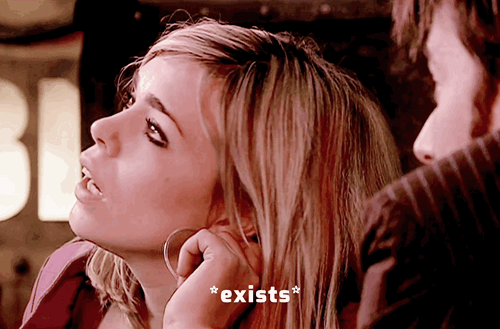
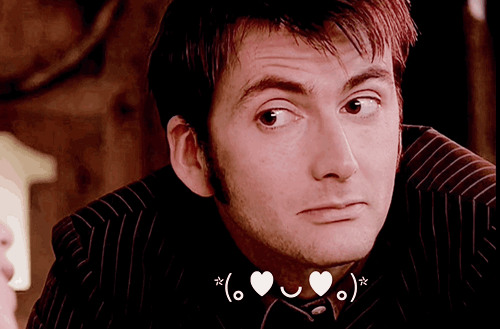
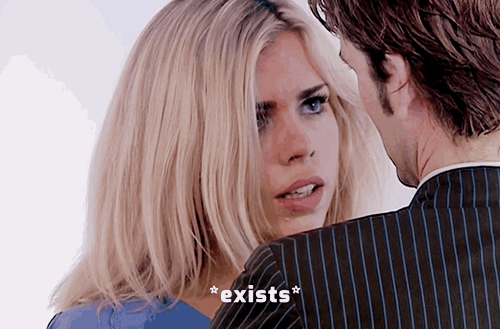
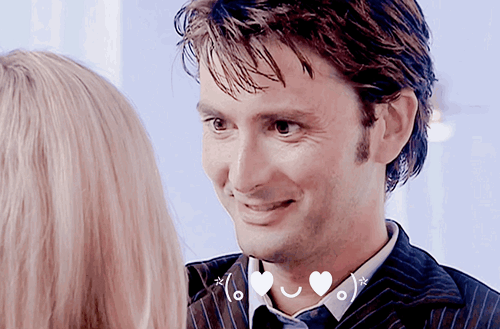
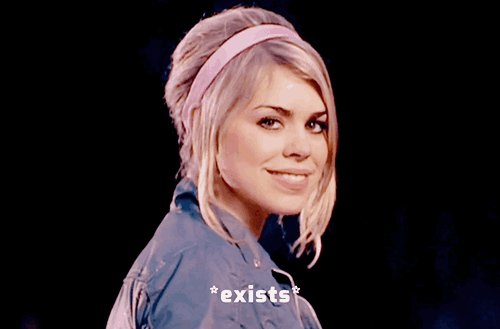
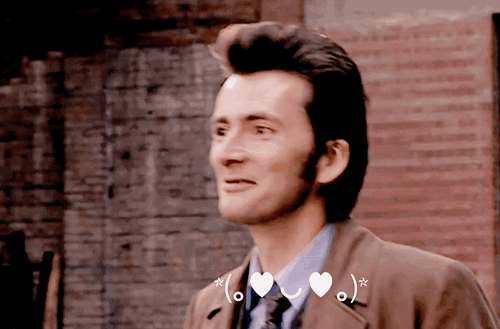
#whipped
(insp.)
#tenrose#ten x rose#tenroseedit#tenrosegifs#otp: my fortuna. that’s you#timepetals#tenth doctor#rose tyler#doctor who#doctorwhoedit#**#he’s so whipped for her it’s insane#to be fair if i was next to billie piper#i would make the same face#they make me ill (affectionate)#i’ll probably redo this once i get photoshop back on my pc bc i didn’t like the colouring that much#but for now have this
3K notes
·
View notes
Note
how would you recommend watching doctor who? there are so many different guys idk how it works.
so the thing about doctor who is that there's two shows -- classic who (1963-1989, doctors 1-7) and new who (2005-2023, doctors 9-14). due to a renumber of the seasons and a change in production company, i think it's fair to call the upcoming version of who (2023-??, doctors 15-??) its own, third show. the reason it's been able to run for so long is that when the show's lead actor, (william hartnell as the titular doctor) had to step down in 1966 due to failing health, they made up some sci-fi bullshit: the doctor's species can 'regenerate' instead of dying, instantly healing but changing their appearance and some of their personality. this means that every time a lead actor has walked away (or, in one unfortuante case, been fired) the show's just recast the doctor and moved on, often with notable changes in tone and format.
the easiest option if you don't want to backwatch anything is to start with this year's christmas special, the church on ruby road (2023). it's an obvious jumping on point to the series, introduces you to all the basic stuff (the doctor, the TARDIS, the fact that it's a silly sci-fi show about fighting weird rubber prop critters), and presumably sets up the upcoming season 1 of the disney-bad wolf version of the show that's gonna come out in may 2024.
if you do want to backwatch, you have to decide if you want to start with new who or classic who. i personally would recommend starting with new who, because there's less of it, it's got higher production values, and (imo this is the biggest obstacle to getting into classic who) it's paced in a way that makes much more sense to a modern TV viewer (self-contained 45-minute episodes). also once you're invested in the show, its main character, and some of its classic elements, you get to soyjak at the screen whenever you're watching classic who and you get to see the oirign of a monster you already recognize. you can also skip classic who entirely and never watch it, they don't bring up anything from it in the new series without giving it a new explanation, but if you do this you hate fun.
anyway, starting points for nuwho: the most obvious one is rose (2005). it's the pilot episode for the new show and imo it holds up brilliantly -- it introduces all the most basic concepts of the show, but ultimately it's really all about billie piper and cristopher eccleston's performances and they deliver. the special effects are gonna be pretty terrible for a while because it's early 2000s cg. there's no jumping on point like it for the whole of RTD's run of the show (imo, the best run of nuwho) so if you want to watch seasons 1-4 you've gotta start on rose.
another episode that's written as a jumping on-point is (heavy sigh) the eleventh hour (2011). as well as introducing matt smith's doctor and his companion amy, this also does the whole rigamarole of introducing the show's core elements, giving a nutshell recap of its history in the form of the doctor's rooftop speech, and also signal what the oncoming moffat era is going to be like (whimsical, full of complex time travel plots, way more misogynist). i'm biased -- i'm a hater, one of this episode's central plot conceits sucks real bad and i also hate the eleventh doctor's whole run. but it is meant to be a jumping on point.
there won't be another one of those in nuwho until the pilot (2017). this begins moffat's final season with which he made the odd but extremely welcome decision to jettison all his convoluted continuity shit from the last five seasons and refocus the show with the doctor being a professor at bristol university with a mysterious secret. i think season 10 is a hidden gem and if you find starting from rose daunting this is the next best place to pick up. capaldi's doctor is a delightful abrasive eccentric with a heart of gold at this point in his run & the stories are wall-to-wall bangers with only a couple misses.
finally, you could start on the woman who fell to earth (2018), the first episode to feature jodie whittaker's 13th doctor and head writer chris chibnall. i'd recommend this even less than the eleventh hour, because while i actually like it more, i think it's a much worse preview of what the upcoming era is going to be like than that one. if you watch the woman who fell to earth and keep watching from the start of whittaker's run on the show off the back of it, you're going to be severely disappointed as most of the more promising aspects of the episode get instantly abandoned.
so, summary, if you're starting with nuwho, there's five jumping on points, which i'd rank:
rose > the pilot > the church on ruby road > the eleventh hour > the woman who fell to earth
but i want to start with classic who because i'm a contrarian
alright. classic who also has a few jumping off points -- before i mentioned them, let me just talk about that format thing i mentioned earlier. classic who doesn't have self-contained episodes for the most part, but rather for most of its run told each of its episodic narratives across between two and seven 20-minute episodes. this leads to a lot of weird pacing, forced cliffhangers, and infamously a lot of filler shots of the doctor running up and down identical corridors. so obvsies i'm recommending entire stories here nad not individual episodes. that said, let's look at where you could jump on:
an unearthly child (1963). this is, like, the start of the show. that said i don't recommend it as a place to start (funnily enough), for a couple reasons. firstly, because of dreadful fucking archiving by the BBC, a lot of episodes from the show's first six seasons are straight up missing. some of them have been animated by the BBC from surviving audio recordings, but some of them are just straight up lost -- due to the format, this means there's very few full complete stories, which makes this whole era really hard to navigate. if you don't mind that and really want to start in the black and white era, i'd still recommend the tomb of the cybermen (1967) instead -- hartnell's portrayal of the doctor as a haughty, slightly impish old professor is great, but troughton basically defined the character's core traits for the next sixty years.
spearhead from space (1970) is a pretty big format upheaval for the show and so serves as a pretty great classic jumping-on point. it's the first episode to be in colour, and sets up a new status quo for the doctor as being trapped on earth and working for an elite paramlitary organization called UNIT that operates out of a ratty office. it's an interesting premise that the show gets some great stories out of. the special effects are bad in the best way. pertwee has instant charm in the role and it's all around a banger by classic standards.
if you want to jump right to the one all the boomers are nostalgic for, you can also start with robot (1974). i wouldn't recommend it, though--tom baker is electric in the role from the start, but the episode itself kind of assumes a lot of the context of the third doctor's setup and supporting cast which you're not gonna have.
i wouldn't recommend anyone start at any point during the fifth or sixth doctors runs because i want them to actually like the show, so i guess the last jumping on point i could really recommend after robot would be, like, dragonfire (1987), which heralds the show's short-lived renaissance with the seventh doctor and his best companion, ace. but although you'd be watching some of the absolute best the classic show ever gets, it feels like it would be a weird and disorienting place to start.
finally, you could watch tales of the tardis (2023), a limited series produced to celebrate the show's 60th anniversary. each episode follows the same format: through a vaguely handwaved Palace of Memories plot, two much-aged characters from the classic series meet up and fondly remember one of the adventures they shared. the bookends with the original actors are mostly shameless fanservice, but the episodes they're reminiscing about are superbly edited down into a much more watchable format -- it works as a good 'sample platter' for most eras of the show (although, weirdly, there wasn't anything from tom baker's run!) and i think it honestly wouldn't be a bad shout to just start from tales of the tardis and then keep watching from whichever of the stories featured in it you liked most. that all said, if you want to start with classic who, i'd rank these jumping on points as follows:
spearhead from space > tales of the tardis > tomb of the cybermen > dragonfire > robot > an unearthly child
all that shit said it's fundamentally a very episodic show with very few exceptions like trial of a time lord and whatever moffat was doing seasons 6-7 so in the end you can basically just start with any episode and more or less get some of the idea. have fun and make sure to do the most important job of a doctor who fan, update the tardis wiki page for penis whenever one is mentioned
658 notes
·
View notes
Text
cat and mouse
(( harringroveson prison au ))
chapter eight | find the rest here
pairing | billy hargrove/steve harrington + billy hargrove/eddie munson + billy hargrove/eddie munson/steve harrington
summary | eddie is jealous + a flashback to his first time with one of billy's 'friends'
a/n | mungrove heavy chapter, but stevie will be back for the next one! i absolutely adore reading comments/thoughts/headcanons, so feel free to message me or drop in my askbox anytime. a special shoutout to my mermaid anon - ArielGemini - for giving me all the ideas for eddie's first time pleasing someone else! fiind it on ao3 here !!
warnings | prostitution, dubcon-ish, dom/sub talk, billy seeing his pets as his property and also being an asshole that can't deal with his feelings, mentions of the branding, daddy kink, possessive behaviour, toxic behaviour, jealousy, steve being a gay panicked confused mess (this is a permanent tag), general prison talk, stuff like that !!
tag list | @whoringrove @darkandstormyslash - let me know if you'd like to be tagged in future updates !!
“Got a real busy afternoon ahead of you, sweetheart. Eat up.”
Billy pushed Eddie’s tray towards him, trying and failing to hide the smirk lingering on his lips. Eddie had absolutely no idea what he was in for, but it was going to be a treat.
Saturdays and Sundays were supposed to be for resting after working all week — they were completely free from the moment the cell doors opened in the morning to the second they locked back up at night; the inmates didn’t even have to go for meals if they didn’t want to. Most of them slept in, some ate noodles for dinner so they didn’t have to move and could relax all day long, but not Billy.
Sundays were for catching up with his drug dealings, and Saturdays were officially for other things now that he had Eddie, who was still new and fresh with big doe eyes and the tightest ass Billy had ever fucked.
He was going for a pretty penny. He raised the price, depending on what the customer wanted and how fucked up their kinks were, but he only had a few rules.
No injuries that would last longer than a week, and no daddy kink. He was Eddie’s daddy— no one else. He’d knock the teeth in of anyone who tried to get him to use the title. Master was fair game, as was Sir, but not ‘daddy’.
Eddie didn’t think too much about it. He couldn’t, or else it’d drive him crazy. He’d learned that quickly — just like everything else. Since the day he’d started dealing he knew if he ever got arrested he’d have to play the role of bitch to survive behind prison walls, and now he was paying the piper.
Instead, he shoved honeycomb cereal into his mouth a little faster, eagerly clearing the entire tray. It was the first time Billy hadn’t taken anything off of it and he devoured every last bit of it.
When they got back to the cell, Billy crowded him against the corner, trapping him in with nowhere to run. “My sweet boy,” he murmured, one hand reaching up to touch over Eddie’s cheek, the other resting on the wall. “You’ve been real good for me, haven’t you? You do everything I say.”
The tone was making Eddie nervous and he shrunk down a bit, hiding behind his bangs. They were long, in his eyes, and he was always trying to shove them away — except for this moment. In this moment he was thankful to have something to hide behind because Billy’s eyes were eating him alive.
“You’re not afraid, are you, sweetheart?” Billy leaned in closer, words a whisper, but Eddie couldn’t move his head back any further. The gap started to close. “I know I can be a little mean when we play, but you know Daddy would never hurt you. Not unless you’re a bad boy and you make me.” His hand spread out, cupping Eddie’s jaw. “Isn’t that right?”
“Yes, daddy,” Eddie nodded his head, cheeks turning the sweetest shade of red because he still wasn’t used to the nickname. He’d wanted the ground to swallow him up the first time Billy made him say it, and although it got easier each time, it still wasn’t natural.
“Good boy,” Billy only pulled back from him to glance towards the tiny little clock they had. “Now, I’ve got a friend coming to see you, and you’re gonna be real nice unless you want to piss me off. You wouldn’t want to do that, would you, my little star?”
Eddie hated that the nickname put butterflies in his belly. It had sprung up after he’d told Billy about how much he loved playing the guitar and how he’d had a band on the outside. Billy had teased him about being a rockstar, which turned into his nickname being his little star.
He shook his head until Billy raised his eyebrows in that way that told him to use his words. “Never,” he whispered, but he didn’t know how he felt about one of Billy’s friends coming around. He’d met Argyle and Tommy and a few of the others, but no one new had ever come to their cell. Especially not to see him. When Billy did his dealing business, he went out, usually over to Argyle’s. It was never the other way around.
“Good,” he smiled, so soft, so kind, and for a second Eddie wanted to lean in and kiss him. Billy could be so cruel but he was the only one that could make him feel better, the only one that would wipe his tears and hold him tight and murmur to him about how they’d go to whatever concert Eddie wanted when they both got out.
Sometimes he pretended Billy was his boyfriend, and those moments were blissful. He lived for them.
He knew Billy knew he did it, too, but Billy had never brought it up. If anything, he just dropped crumbs here and there whenever he was in a good mood to feed the fantasy.
“You’re not gonna leave, right?” He whispered, but when Billy didn’t immediately answer, panic started to spread along his chest. “Billy? You won’t leave me, right?”
“Shh,” Billy hushed him, rubbing his thumb over Eddie’s lips. “I’m not going anywhere. Gonna stay right here and enjoy the show.” It was only because it was the first time, he told himself. He didn’t want Eddie to fight and get himself into trouble. Besides, he hadn’t rented anyone out in awhile. He needed to make sure his clients weren’t completely out of line.
Eddie nodded his head a bit, about to let out a sigh of relief, when there was a knock on the door. It was more like a thump than a knock, and Eddie almost yelped from the surprise of it. Billy grinned at how jittery he was, and opened the cell enough to let the so-called friend in.
It was a man in his earlier forties or so, ripped and tanned with tattoos slinking along his skin. Eddie though he looked quite a bit like a wall — large, broad, tall.
He felt pathetically small beside him. Like he was lanky, scrawny. Even Billy looked a bit small on side of him.
“He’ll be real good for you. Promise,” Billy shook the man’s hand before backing up and sitting himself down on the closed toilet lid. Eddie looked to him for help, about ready to race to him, but one tiny gesture was all it took to plant him in place. “He’s tight. The tightest fucking thing I’ve ever stuck my dick in. You rip him and it’s an extra fifty.”
“What?” Eddie’s eyes flew open in a panic, pressing his body back against the wall to get as much distance between him and the man as possible.
“Quiet, Eds. Grown ups are talking,” Billy taunted, putting his finger to his lips to silence him.
“Yeah, alright. You got the money?” The man’s voice was a bit gruff, and he reached out to slip his hand along the sliver of skin just above the waist of Eddie’s trousers. His eyes devoured every last inch of Eddie that he could see.
“Got it. You know the rules. Have fun,” Billy was grinning the same mean grin that Eddie hated seeing, but his attention was torn back to the man when his face was touched.
“Jesus, he’s pretty. You should get him in some lingerie, Hargrove. Dress him up all sweet. Put little bows in his hair,” The man grinned as he spoke, twisting a piece of Eddie’s hair around his finger, and even though he was looking directly at Eddie, he spoke to Billy like he wasn’t even human— more like he was a doll.
“I’m working on it,” Billy spread his legs and held onto the toilet between them in order to lean forward a bit. “Go on, pretty baby. Take off your clothes. Show him what he’s bought.”
Eddie’s cheeks were on fire and he hated that his cock was coming to life. He didn’t want to get turned on over being sold for a price he didn’t know, but he couldn’t stop it.
He’d learned on his first night that he couldn’t stop it and had to try his best to enjoy whatever was happening because his body would whether he liked it or not. It was easier if he tried to work with his body instead of against it.
The betrayal that came when his body reacted no matter what he was feeling, no matter how afraid or sickened he was, was the worst torment he’d ever experienced. It was gut wrenching.
His movements were hesitant, slow, as he peeled the sweatshirt off, and he looked to Billy for approval — or maybe encouragement — before he took off his bottoms. All Billy had to do was clear his throat, quirk his left eyebrow the tiniest bit, and then he was sliding the prison issued underwear down his legs, too.
He’d never felt so vulnerable in his life. There were two fully clothed men fucking his naked body with their eyes and he awkwardly tried to do something with his arms instead of letting them hang. He had a few tattoos, a couple littered along his skin, and was quite pale and fairly lanky, but he was beautiful, perfect, even, at least to Billy. The trail of hair from his belly button down was sexy.
Eddie was afraid the man was about to start frothing at the mouth.
“Go on, stroke yourself. Get hard. Show him how your cock gets even prettier when it’s hard,” Billy coaxed, and Eddie’s lip quivered a little as he reached to wrap his palm around his member. “Oh, my poor baby. It’s okay, sweetheart. You can cry all you want but you don’t have to feel shy.” There was something nasty about Billy’s tone, how filled with mockery it was. “Keep stroking and bend over. Want him to spread your cheeks and have a look at that tiny little hole.”
He wasn’t sure he could do it. His body was froze up, hand around cock, eyes trained on Billy. He was scared and turned on and scared of being turned on. Before Billy could warn him to be good and do as he was told, the man was shoving his upper body downwards to be able to spread his cheeks and get a good look. “Oh, shit, Hargrove. He is small. I might tear him.”
“Like I said, fifty bucks, amigo,” Billy reiterated, reaching out to touch Eddie’s hair as he was close enough while bent over. “Go on. Push a finger in. He likes it dry. Training him to love a bit of pain.”
There was a snicker, and then a thick finger was being pushed into Eddie’s ass. He let out a whimper, but his cock hardened a bit more in his hand at the feeling.
It filled out all the way when a big palm came in contact with his bottom and he yelped in pain. “See? He loves it,” Billy snickered at Eddie’s cock. “Do it again. Harder.”
The second smack made Eddie cry out, hands reaching for Billy. He wanted to be held, cuddled, something, but the most Hargrove allowed was for Eddie to hold onto his thighs.
It didn’t last very long; after a third smack, the man was yanking Eddie around and forcing him onto his knees. Eddie didn’t need to be told what to do; his fingers automatically went to pull down the trousers in front of him. “Your mouth is all the lube you’re getting, big boy. Make it count.”
***
There was a long period of silence after Billy had left. For awhile, Eddie had thought Steve had passed out. The sniffling had stopped, he wasn’t twitching his hips against the bed like he wanted to fuck the mattress. He was just still. Eddie rested his head back against the wall, not wanting to be the one to break the silence.
“Have you got one?”
Steve’s voice was so small that Eddie had barely caught it at first. He didn’t immediately reply, but gave it a few moments, making sure he had really heard the words correctly.
“No. Never fucked up and called him something I shouldn’t have, I guess,” He muttered in response.
He hated that he was jealous. It was fucked up, and he knew it was fucked up, but he couldn’t help it. Steve hadn’t even been around for twenty four full hours and he had a marking, something permanent that showed he was Billy’s, yet Eddie had been around for years and had done everything that had ever been asked of him and nothing.
No tattoo, no branding. No dumb bracelet or ring made out of string or paper. Everyone knew he was Billy’s, at least to some degree now that he wasn’t in his cell anymore, but he had nothing to show for it.
There were tears prickling at his eyes and he pulled one of his knees up to his chest, picking at the fabric of his uniform. He knew Billy loved him in his own way, had a soft spot for him, but it wasn’t enough. He wanted more, but now he had to share the little time he had with Billy with Steve.
Steve was going to weasel his way into Hargrove’s heart if he hadn’t already, Eddie was sure of it. Harrington had the biggest doe eyes, was so naive where Eddie knew too much. He was fresh and new and Billy had a clean slate to play with, a brand new mind to fuck over. He would have so much more fun with Steve now than he would Eddie, who was broken and used and too doting.
“Does it hurt?” Eddie whispered, taking a glance over to Steve’s rear. He was face down on the bed, trousers still pulled down to where Billy had left them.
“Obviously.”
Eddie’s eyes trained on the seared skin. It was red and swollen and raw, looking ugly and sore. It’d heal horribly without the proper care and may not have even looked like a H in the end, but it didn’t matter. The memory would always be there. “You gonna break more rules if I leave you? You’re not gonna try to get off or anything, are you?”
“No. I’m staying right here, just like this,” Steve muttered, trying to get under the sheet to cover his lower half up. Eddie got up off the bed to make it a bit easier on him, and after staring at him for a few moments, went to the cell door to leave.
“He’s not that bad if you just listen to him and follow his rules. You’re lucky to be in here, in his cell,” Eddie’s voice was the one that was small then, and Steve turned to look at him to see if he was being serious.
“Are you crazy? Did you not see what he just did? And you’re saying I’m lucky?” Steve looked offended, but Eddie didn’t have it in him to explain what he meant. It was something Steve would understand in time.
“Yeah,” he pulled open the cell door. “I am.”
***
Billy didn’t return until much later in the day. Steve was asleep by the time he’d made an appearance, exhaustion taking over after the fight or flight wore off, but the first thing Billy noticed was that Eddie was gone.
“Did I not tell you to stay with him?” Was the first thing Billy said after bursting into Eddie’s cell, his bunkie sprawled on the top bunk, high out of his head and eating pot noodles. “Get the fuck out. Have to talk to Munson,” Billy snapped at him, and the man slowly climbed off the bunk and moved around him to leave.
No one questioned Billy. When he told them to do something, including leaving their own cell, they did it. Unless they were looking to end up in the infirmary for awhile.
“He was fine. I wasn’t going to just sit there and watch him sleep all day. He said he wouldn’t do anything,” Eddie was on his bottom bunk, novel in hand. It was one he’d read a million times, his hand writing sprawled along the margins and pages wore.
It was one Hargrove had given to him on his first Christmas on the inside, their first Christmas together.
Billy narrowed his eyes, cocking his head to the side. His frown slowly turned into the lazy half smile he was so famous for. “You’re jealous.”
“I’m reading,” Eddie muttered, turning the page. He should have known Billy would know how he was feeling — he always did.
“Close it. Now.”
Eddie heaved a sigh as he put in his bookmark. “What?”
“Kneel down here so we can have a conversation, if you want to act like a little bitch,” Billy pointed to his feet. “You jealous I marked him up, baby? I’ll burn my whole goddamn name on your sweet ass if that’ll make you happy.”
“You’re such an asshole sometimes,” Eddie shook his head, but he did move to kneel down again. He knew better than to not obey. “I don’t understand how you don’t give a shit about me. Even after all this time. Everything I’ve done—“
Billy let out a dramatic groan. “Jesus Christ, Munson, I didn’t know you were suddenly such a pussy. Should I dress you up all pretty to go with your new attitude, huh? Haven’t done that in a long time.” His grin was wicked, almost a sneer.
“Can’t you just have a normal fucking conversation?” Eddie burst out, running his hands through his hair. “Fuck, Billy.”
The outburst surprised him, and Billy bent down a little, hand moving to tip Eddie’s chin up. “Go on then. Let’s have a normal conversation. Use your words like a good boy.”
“He’s been here two seconds and you’re already in love with him,” Eddie wanted to push Billy’s hand away, but he couldn’t. He wanted more, wanted more attention, more love, more pets.
“I’m not in love with anybody. Never have been. Would do you good to remember that, sweetheart,” he murmured, and Eddie finally looked up to meet his eyes. They were focused in on him, watching his face like he was a specimen in a lab. “I think you’ve gone too far with that little fantasy of yours.”
“Fuck you,” Eddie could feel his eyes watering and he desperately tried not to let the tears fall. “You’re either lying, or you’re crueler than I ever thought you could be. You’ve said—“
“I know what I’ve said. I’ve said shit to pacify you, to reel you in,” his lips pulled up into a smile. “You know better than anyone how much I love games.”
Eddie pulled away from him them, falling back onto his arse to scramble back and away from him. “You’re a fucking cunt, Billy.”
“And you’re a jealous little whore,” Billy’s smile turned into a nasty grin. “Do you see yourself? You’re upset because I branded him. I burnt his flesh with my initial and you’re jealous that I didn’t do that to you. Some people would say that’s real fucked up, Eds.”
“Shut up,” Eddie shook his head.
“He hasn’t even been here two days and you’re already this jealous. What’re you gonna do when I sink into his ass, huh?” Billy taunted. “And what about afterwards, when I climb into bed beside him, and hold him, make him feel better, tell him about the ocean and California and all the other shit I told you, and the one before you, and the one before him?”
There hadn’t been anyone before Eddie. There hadn’t been any other pet before him, not any permanent one, anyway. He’d gotten to practice on others, had sold a few people, but he’d never had anyone of his own. Eddie was his first — and he was special. There was a special place inside of him reserved for Eddie and all the things he said, all the words whispered in the dark about teaching him to surf, and taking him to concerts, and getting a shitty little flat together on the outside, had been true. He’d meant them.
He still meant them. He didn’t know why there was such nasty words coming from his mouth, why he couldn’t just be gentle and real for two fucking seconds.
It wasn’t like he wanted to lose Eddie. He didn’t want to lose Steve, either. He just wanted them both, wanted both of them to be his good boys.
“Get out.” Tears were falling down Eddie’s cheeks, little drops of water on pale skin, and he tried to get up. “Get the fuck out. Get out of here, you absolute fucking ass. I hate you.”
Billy grinned at him, trying to ignore how the words hurt. They cut through his heart like butter and a part of him wanted to pull Eddie in for a hug, hold him tight, tell him he was sorry. But he didn’t — couldn’t. Instead, his hand reached out, backhanded Eddie hard enough across the face that he went toppling back to the floor. “You’re gonna pay for that one, baby boy. You want me to go? I’m gone. Find someone else to protect you. We’ll see how long it takes for you to come kiss my feet and beg for forgiveness.”
And then he was gone. No real punishment, no apology. Eddie sunk back to the floor and curled his knees up to his chest, hand reaching to touch the cheek that would have a pretty purple bruise bloom within a few hours.
The worst part of it all was that Billy was right. He would go crawling back, he would try to beg for forgiveness and make it up to him, and the idea of Billy not accepting it, of replacing him with Steve and never speaking to him again, was nearly paralyzing.
***
With every thrust forward, the man pushed Eddie face a little further into Billy’s lap. He was on his hands and knees, head just about resting on Billy’s thighs. He was a mess, his chin covered in drool that smeared into Hargrove’s sweatpants, skin prickled with sweat and hair sticking to his cheeks.
The man had milked two orgasms out of him before he’d even started fucking him, just to have him slack and hazy. It had been his first time hitting his own high with a cock down so deep in his throat that he’d gagged on it, and Billy was just about sure it was the prettiest thing he’d ever heard in his life. The way he’d struggled around the length of it while trying to cry and moan was something that was definitely going to be recreated again.
“Look at you,” Billy cooed, wiping Eddie’s hair out of his face. “All drunk on his cock. You remember in the beginning, how afraid you’d been when I told you I was gonna sell you?” He held Eddie’s hair back with one hand and used the other to grasp his chin, force his head up to meet his eyes. “And now look at you. Such a fucking slut. Desperate for any and every cock you can get.” Eddie let out a sound at the words. It was a cross between a whimper and a moan, sad acceptance that Billy was right. “Shh, baby. You don’t have to cry. You’re being a real good boy.”
“How many you think he’s got in him?” The man asked. Beside from the comment he’d given before Eddie had started blowing him, he hadn’t spoken to Eddie at all. It was always to Billy, like the man he was actually fucking couldn’t understand him at all.
“Good question,” Billy hummed as he tipped his head to look underneath his pet. “He’s still dripping. Bet he could give another two before he’s out.”
The inmate pulled out and Eddie was about to protest when he was pulled upwards. He always preferred to wait for Billy to go soft in him before pulling out.
A cockwarmer, Billy had called it. He was a pure cockwarming cockslut.
“Now, look at the mess you’ve made,” Billy, still holding Eddie’s hair, yanked it to direct his head downwards so he was forced to look at the puddle he’d produced. “Clean it up.”
Eddie felt slow, dazed. His first reaction was to reach for the toilet paper that was kept beside the tiny toilet in their cell, but both men burst into laughter. His cheeks had never burned so hot.
“Nuh-uh, sweetheart. You don’t need that. You’ve got a perfectly good mouth on you that can do the job well,” Billy sounded genuinely amused.
“You want me to…” Eddie looked down at the mess. He’d never tasted his own cum before, not directly. He’d tasted it on Billy’s mouth once or twice, but that was about it.
“No, I don’t want anything. I’m telling you to bend down and lick it up.”
When he hesitated, one of the two men surrounding him - he wasn’t sure which - pushed him down and held him just an inch or two above the mess. They erupted into laughter again when his tongue sneaked out to dip in it, and he was sure every inch of his pale skin had turned pink from how hard he was blushing.
He wasn’t allowed back up until the floor was clean again.
“Well?” Billy smirked, pulling him back up straight. “Don’t you taste sweeter than sugar, baby?”
Eddie made a face. It didn’t taste much different than Billy’s, but just knowing it was his own made him think it was absolutely foul.
“Aw. Poor boy didn’t like it,” Hargrove laughed again and let him go to snake his cock out of his trousers. “Come here, sweetheart. I’ve got some more for you. Let’s see how well you use your mouth when there’s someone pounding into you.”
#billy hargrove#harringrove#mungrove#harringroveson#billy hargrove fic#eddie munson#steve harrington#harringroveson fic#harringrove au#prison au#harringroveson au#my writing#tw: prostitution#tw: prison#tw: possessive behavior#tw: jealousy#tw: toxic behavior
9 notes
·
View notes
Text
MOVIES on TV!
Part 1 ~ The Movies of “I Love Lucy”
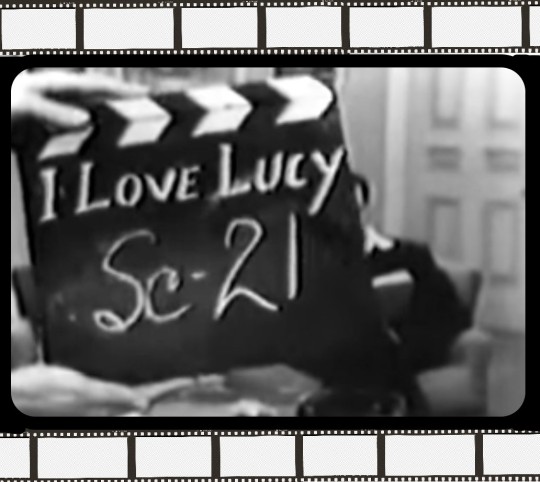
When “I Love Lucy” premiered in 1951, Lucille Ball was a bona fide movie star. By contrast, her creation Lucy Ricardo was a fan - idolizing film stars and Hollywood.
~FACTUAL FILMS~
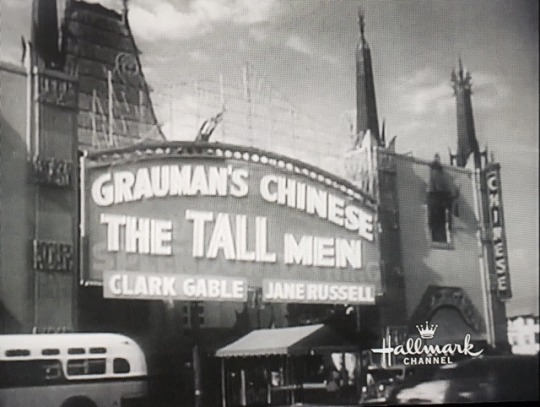
THE TALL MEN ~ “Lucy Visits Graumans” (1955)
Other than this establishing shot, there is no mention of the film, which starred Clark Gable and Jane Russell. “Lucy” actors Will Wright and Harry Shannon were also in the cast. It premiered at Graumans on September 22, 1955.
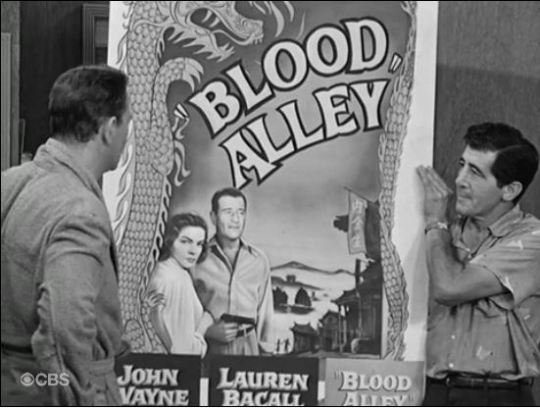
BLOOD ALLEY ~ “Lucy and John Wayne” (1955)
The film is promoted by Wayne approving of a large poster of the film, which co-starred Lauren Bacall.
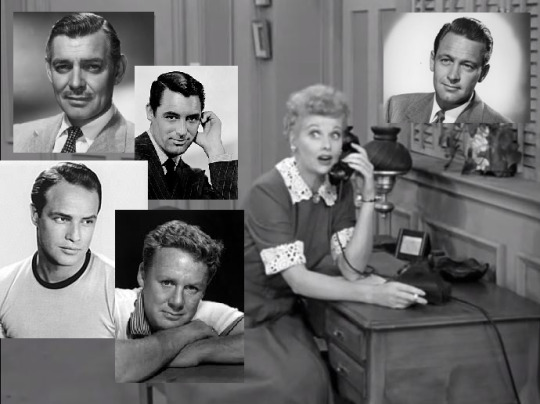
SABRINA ~ “Getting Ready” (1954)
LUCY: (on the phone) “Would you like me to give a message to any of the gang out there? You know, Clark or Cary or Van or Marlon? Oh, all right. (writing) Tell Bill Holden that Marion Van Vlack saw ‘Sabrina’ five times!”
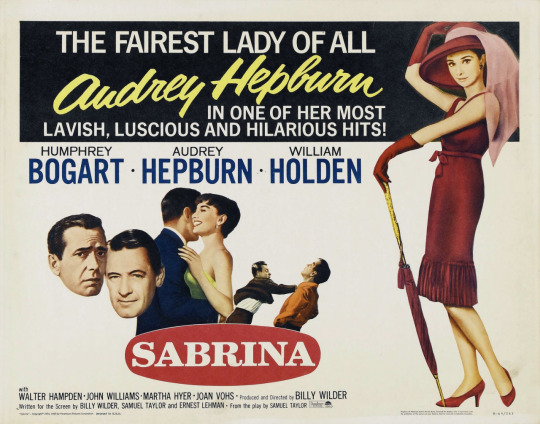
Sabrina is a 1954 romantic comedy-drama directed by Billy Wilder, based on Samuel A. Taylor’s play Sabrina Fair. In addition to Holden, the movie starred Humphrey Bogart and Audrey Hepburn. “I Love Lucy” character actors Ellen Corby and Nancy Kulp play supporting roles.
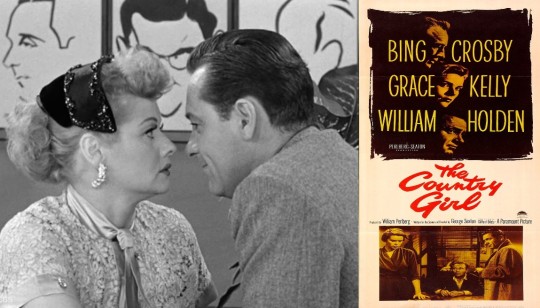
THE COUNTRY GIRL ~ “L.A. at Last” (1955)
William Holden promotes his latest film co-starring Bing Crosby and Grace Kelly. Also in the cast were “Lucy” actors Sarah Selby, Frank J. Scanell, Gene Reynolds, Paul Fix, and Harold Miller.
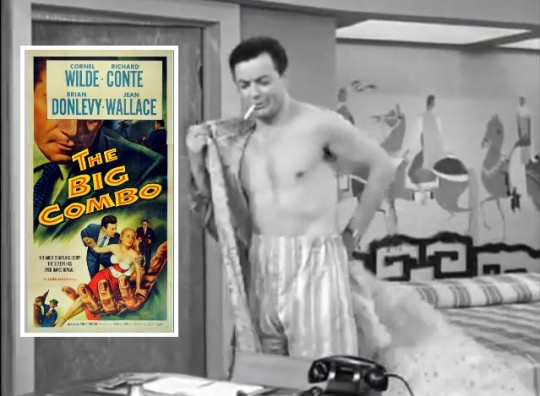
THE BIG COMBO ~ “The Star Upstairs” (1955)
Cornel Wilde promotes his latest film co-starring Richard Conte, Brian Donlevy, and Alan Wallace. Also in the cast were “Lucy” actors Jack Chefe and William Conaty.

A PRIZE OF GOLD ~ “The Tour” (1955)
Richard Widmark promotes his latest film, his first for Columbia Pictures.

CAMILLE ~ “The Dancing Star” (1955)
While singing “How About You” with Van Johnson, Lucy mentions the 1936 film Camille, which starred Greta Garbo and Robert Taylor. Although Taylor never appeared on the series, Lucy claims to have met him at the Farmer’s Market and gotten his autograph on an orange. As for Van Johnson, he appeared with Lucy and Desi in Too Many Girls (1940) and with Ball in Easy To Wed (1946).
There are several other mentions of the film throughout the series, but it is unclear if they are referring to the character from the Dumas fils book and play or the film. This is also true of Gone With The Wind.

CAPTAIN LIGHTFOOT ~ “In Palm Springs” (1955)
Guest star Rock Hudson promotes his latest film co-starring Barbara Rush and Jeff Morrow.

THE SHEIK ~ "The Hedda Hopper Story" (1955)
MRS. MCGILLICUDDY: "Oh, and I must see the house where Rudolph Valentino lived. Oh, I'll never forget him in ‘The Sheik’. (sings) I'm the Sheik of Araby. Your love belongs to me..."
LUCY: "You know, they're grooming Ricky to be another Rudolph Valentino."
MRS. MCGILLICUDDY: "Ricky? Ricky who?"
RICKY: "Ricky me. That's who."
MRS. MCGILLICUDDY: "You? (mocking laugh) Why, you're not fit to touch the hem of his bernouse!"

THE IRON PETTICOAT ~ “Lucy and Bob Hope” (1956)
As Hope enters Yankee Stadium, a young fan (David Saber) asks him for an autograph. Before granting it, he asks the boy “Have you seen my latest picture, ‘The Iron Petticoat?’” The boy eagerly replies, “Yes, sir.” However, the film, co-starring Katherine Hepburn, didn't premiere in the USA until early January 1957, three months after this episode aired. It was produced and directed by Ralph and Betty! Not the Ramseys, but Betty Box and Ralph Thomas. Hope had appeared in two films with Lucille Ball, and would do two more.

LIFEBOAT ~ “The Celebrity Next Door” (1957)
Ethel gushes to Tallulah Bankhead that she saw her in Lifeboat (1944).
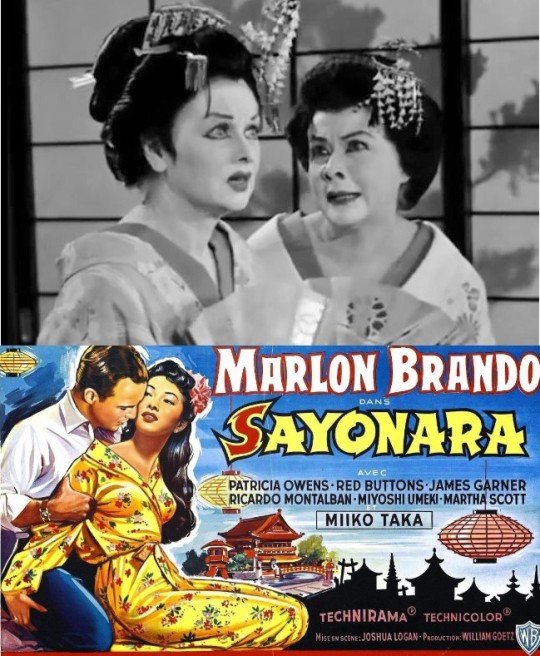
SAYONARA ~ “The Ricardos Go To Japan” (1959)
Trying to be savvy about Japanese customs, Lucy says she sat through Sayonara twice. The 1957 film details a romance between an Air Force pilot (Marlon Brando) and a Japanese woman (Miyoshi Umeki), winning four Oscars.

FOREVER DARLING ~ “Ricky’s European Booking” (1955)
The episode features the Pied Pipers singing the title song from Lucy and Desi’s upcoming fantasy film featuring James Mason.

At the end of the original broadcast of “Bon Voyage”, there was a tag scene to promote the film (and record). Although cut for syndication, the DVD restores this tag scene. Lucy and Desi [or is it Ricky?] are seen sitting in deck chairs.
LUCY: “Did you see the ship’s newspaper? They just raved about your new MGM record of ‘Forever, Darling.’ They said it’s gonna be one of the top records of the year. Let’s get them to play it on the public address system. I know how modest you are, but think what a treat it would be for the passengers.”

SEVEN BRIDES FOR SEVEN BROTHERS ~ “Lucy in the Swiss Alps” (1956)
LUCY: “You remember that picture 'Seven Brides for Seven Brothers'? Somebody shot a pistol and it caused a great, big avalanche.”
After getting trapped by an avalanche, Ethel asks “How'd they get out in 'Seven Brides for Seven Brothers'? Lucy replies that “They waited for the spring thaw!”
~FICTIONAL FILMS~
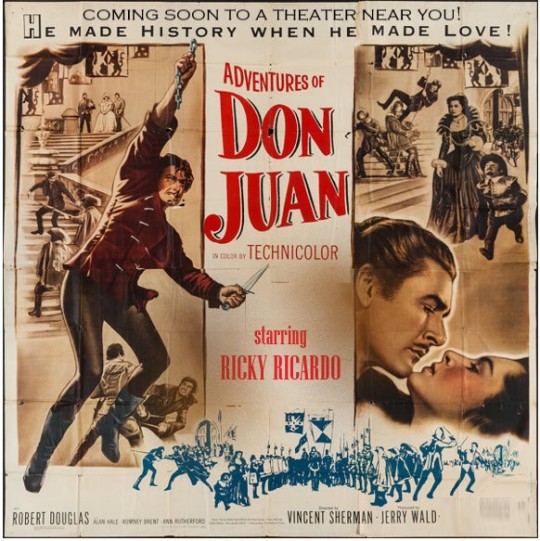
DON JUAN
The film that takes Ricky Ricardo to Hollywood is mentioned in dozens of episodes.
“Don Juan is all about love. It’s got nothing to do with marriage.” ~ “Don Juan and the Starlets” (1955)

SIGNORA LORENZO: “Hark! Do I hear a footfall? Is that you, Don Juan?”
DON JUAN: “Yes, it is I, O lovely one. Would that I had the power to tell you what is in my heart tonight.”
SIGNORA LORENZO: “What do you mean, my dearest?”
DON JUAN: “I have come to say farewell.“
SIGNORA LORENZO: “No, say not so.”
DON JUAN: “Would that I could ask you to fly with me, but I know that you’re devoted to your husband, Count Lorenzo.”
SIGNORA LORENZO: “Yes, much as I love you, I must stay with him. He is old and feeble and he needs me.”
DON JUAN: “But for him, I would sweep you into my arms and carry you over yon garden wall.”
SIGNORA LORENZO: “Oh, that I could cut these ties that bind me!”
DON JUAN: “Do not cry, my dearest. It was not meant to be. I had no right to win your heart. I had no chance to win your love. So, now, I’m afraid I must say farewell."
Lucy reads that Variety reports that Ricky’s Don Juan is scheduled to have a $3 million budget and be filmed in color. Errol Flynn played Don Juan in Adventures of Don Juan in 1948, which was also in color and budgeted at 3.5 million dollars. Douglas Fairbanks played the character in 1934, and John Barrymore was in a 1926 version that featured a young Hedda Hopper, before she turned to journalism.

MOON OVER BAGHDAD ~ “The Mustache” (1952)
A talent scout (John Brown) is casting a new film called Moon Over Baghdad, an Arabian nights-style Technicolor extravaganza. This is the first time we get a hint of Ricky’s movie aspirations, which will eventually take the foursome to Hollywood in season 4. Through tenuous connections (“My agent has a friend whose brother-in-law knows the talent scout’s wife.”), Ricky, Lucy (beard concealed), and the Mertzes all vie for his consideration. In the final scene, Lucy has finally managed to remove her whiskers and Ricky lands a screen test for the film, although we never hear anything about it again, even when he tests for Don Juan in season 4. There’s also an offer for Lucy.
LUCY: “I don’t care what they pay me. I am not going to play the part of your father!”
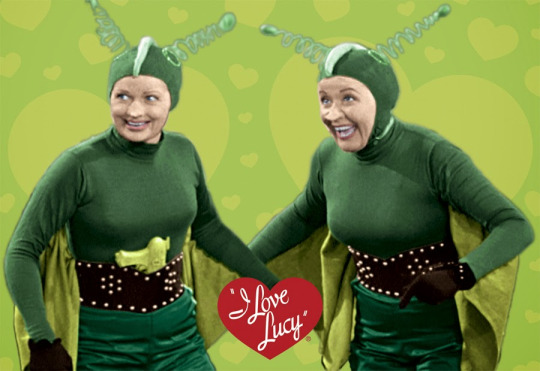
WOMEN FROM MARS ~ “Lucy is Envious” (1953)
Lucy and Ethel make money to fulfill a pledge by doing a stunt for an upcoming film, Women from Mars. The plot was most likely inspired by the 1953 film The War of the Worlds which is also about a Martian invasion. Two days before this episode aired, a British film called Devil Girl from Mars hit US cinemas. Also hitting the big screen in 1953 was Invaders From Mars, which featured Hillary Brooke (“The Fox Hunt”) and Richard Deacon (“The Celebrity Next Door”). America had Martian madness!
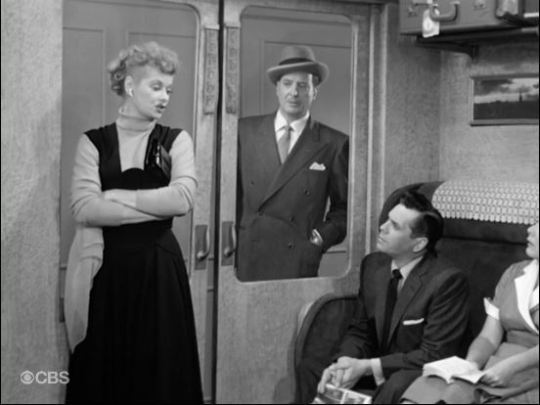
BITTER GRAPES ~ “Lucy’s Italian Movie” (1956)
On the train to Rome, Lucy is eyed by Vittorio Philippi (Franco Corsaro). Taking the title literally, Lucy investigates the wine-making business, leading to one of the funniest scenes in television history as Lucy stomps grapes.

After a tussel in the vat, Lucy proves to ‘blue’ for the role - a typical American tourist - which goes to Ethel instead. Lucy one bitter grape!

TROPICAL RHYTHMS ~ “Home Movies” (1954)
Ricky creates an audition film for a television project. Then Lucy and the Mertzes add their own home movie (a Western) to create a very chaotic film.
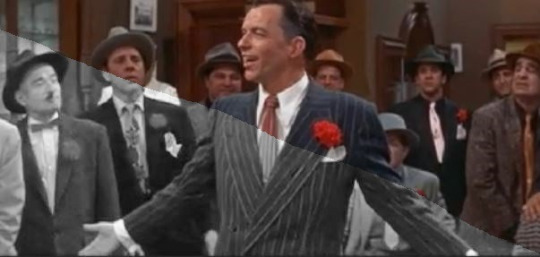
GUYS & DOLLS ~ “Lucy and the Dummy” (1955)
When the episode was running short, a preview clip of the upcoming MGM film musical starring Frank Sinatra was inserted into the Executive Show sequence. After one airing, the sequence was removed and has never been restored. The morning after the original broadcast, fans phoned a bewildered Sinatra to tell him he was on “I Love Lucy” last night - which he knew nothing about!
~UNMENTIONED TITLES~

Un-Titled Florida Project ~ “Desert Island” (1956)
Ricky announces that he’s going to be in a film about the history of the state of Florida. The movie will feature Claude Akins (as a giant native), Joi Lansing and Jil Jarman. Ricky says he will appear in the ‘modern’ scenes playing with his band in the hotel nightclub. In real life, Desi Arnaz got his start in showbusiness in a Florida nightclub.

CLUNY BROWN ~ “The Fox Hunt” (1956)
A few seconds of establishing stock footage of Berkshire Manor was taken from the 1938 Ernst Lubitch film Cluny Brown, which was filmed by 20th Century Fox in a Hollywood studio, but takes place in England. In the film, the home is named Friars Carmel Manor, but with the exception of the lettering bearing the name, the footage is identical.
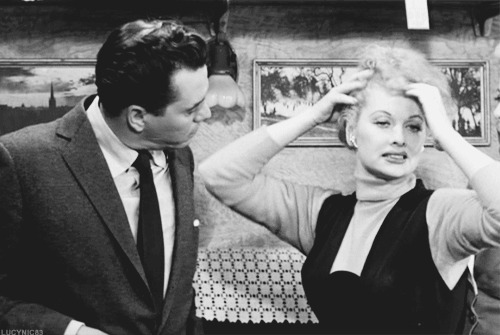
STAGE DOOR ~ “Lucy’s Italian Movie” (1956)
LUCY: “The calla lilies are in bloom again.”
This is a quote from Stage Door (1937), which Lucille Ball always called her ‘big break’. It was Katherine Hepburn’s first line in the play within the film, and was repeated throughout the movie. Ball always admired Hepburn, and it is possible the writers included the line as an homage to her.
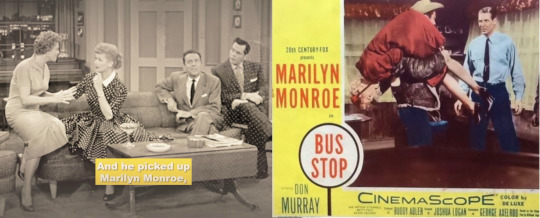
BUS STOP ~ “Lucy and Superman” (1957)
The Appleby’s come over for a social evening. As the scene opens, Caroline is in mid-sentence talking about a film.
CAROLINE: “And he picked up Marilyn Monroe, slung her over his shoulder and carried her off!”
Although the title is never mentioned, the film they are discussing is Bus Stop, starring Marilyn Monroe and Don Murray. It was released in August 1956, two and a half months before this episode was filmed. Frequent “Lucy” character actor Hans Conried has a featured role in the film.

HOW TO MARRY A MILLIONAIRE ~ “Changing the Boys Wardrobe” (1953)
The gang is heading to the movies to see “That picture we’ve been trying to get to for weeks with Marilyn Monroe.” The movie is either Gentlemen Prefer Blondes, which premiered in New York City in July 1953, or How To Marry A Millionaire, which premiered (just in Los Angeles) one day after this episode was filmed.
ETHEL: “Wasn’t that a wonderful dress she had on in the big number?”
Both films were musicals, so this doesn’t narrow it down very much. In either case, it is likely that the title goes unmentioned because Lucy and Desi had just filmed The Long, Long Trailer for MGM Studios and How To Marry a Millionaire and Gentlemen Prefer Blondes were 20th Century Fox pictures.
~FILM INSPIRATIONS~

MURDER AT THE VANITIES ~ “Lucy Gets Into Pictures” (1955)
Lucy finally gets a part as a murdered showgirl in an (un-named) Hollywood movie directed by Ricky’s friend Frank Williams (Lou Krugman). The film may have been inspired by 1934′s Murder at the Vanities, in which Lucille Ball had an uncredited role as a showgirl.

THE MAJOR AND THE MINOR ~ “The Kleptomaniac” (1952)
Under hypnosis (and with a knowing wink to Ethel), Lucy reverts to childhood, with a story and a voice doubtlessly influenced by Ginger Rogers in the 1942 film The Major and the Minor.
LUCY: “It all started when I was a little girl. I was riding on the streetcar one day and I looked up and I saw a box and it said, 'take one.’ So I took one. From then on, I took anything that came into my pretty head even though it didn’t say 'take one.' I took a bright new penny. I took a bicycle. I took a little boy. But my mother made me give him back.

DUCK SOUP ~ “Lucy and Harpo Marx” (1955)
The mirror routine between Lucy and Harpo was first performed by Groucho in Duck Soup (1933). Lucille Ball and Harpo had appeared together in Room Service in 1938 for RKO Studios.

DANCE, GIRL, DANCE ~ “Bullfight Dance” (1955)
The final look for Lucy’s bull costume was no doubt inspired by Ferdinand the Bull, the story of the bull who’d rather pick flowers, than face the picador. The character was integral to the story of Lucille Ball’s 1940 film Dance, Girl, Dance.

GENTLEMEN PREFER BLONDES ~ “Second Honeymoon” (1956)
The plot of this episode very closely follows the adventures of Lorelei Lee (Marilyn Monroe) in the 1953 film Gentlemen Prefer Blondes. In common with this episode and the film is extra Monty O'Grady, who played a passenger on both vessels! Also look for “I Love Lucy” actors Norma Varden (Mrs. Benson in “The Ricardos Change Apartments”), Elliott Reid (Edward Warren from “Face To Face”), and Bennett Green (Desi’s stand-in and veteran background player).
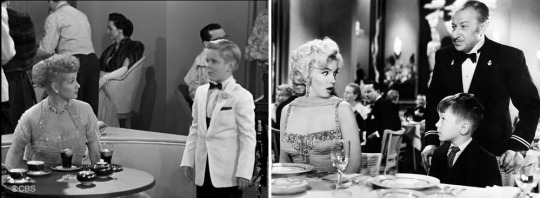
Lorelei’s dinner companion turns out to be a seven year-old boy, just like Lucy’s ping pong partner turns out to be young Kenneth Hamilton played by nine year-old Harvey Grant.
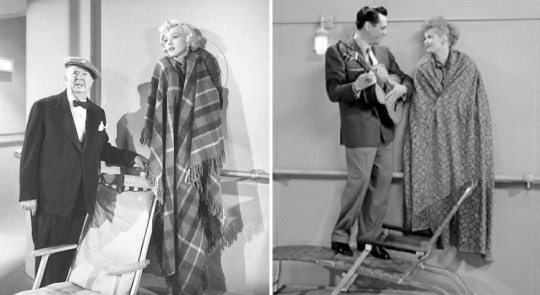
Lucy gets stuck in a porthole just as Lorelei did, also draping a blanket around her shoulders so passersby wouldn’t know what was really going on.
~FILM FUNNIES~

“Ricky Needs an Agent” (1955)
Trying to suggest possible film projects for Ricky, Lucy insert him into the titles of some of Hollywood’s best-known movies:
“Ricky, Son of Flicka” / Thunderhead, Son of Flicka (1945)
“A Streetcar Named Ricardo” / A Streetcar Named Desire (1951)
“Gone With the Cuban Wind” / Gone With the Wind (1939)
“Three Cubans in a Fountain” / Three Coins in the Fountain (1945)
“It Happened One Noche” / It Happened One Night (1934)
“Seven Brides for Seven Cubans” / Seven Brides for Seven Brothers (1954)
“Meet Me in St. Ricky” / Meet Me in St. Louis (1944)
“The Ricardos of Wimpole Street” / The Barretts of Wimpole Street (1957)
“Andy Hardy Meets the Conga Player” / Andy Hardy Meets Debutante (1940)
“Arsenic and Old Ricky” / Arsenic and Old Lace (1944)
#I Love Lucy#Lucille Ball#desi arnaz#William Frawley#Vivian Vance#Movies#Films#Richard Widmark#William Holden#Van Johnson#Rock Hudson#John Wayne#Tallulah Bankhead#Bob Hope#Cornel Wilde#TV
4 notes
·
View notes
Text
The week in review:
Raw 12/14
NXT 12/16
NXT UK 12/17
Smackdown 12/18
TLC 12/20
+
Main Event 12/17
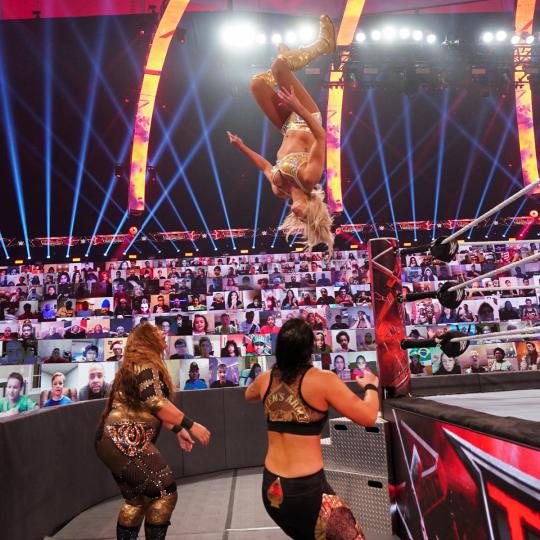
Raw:
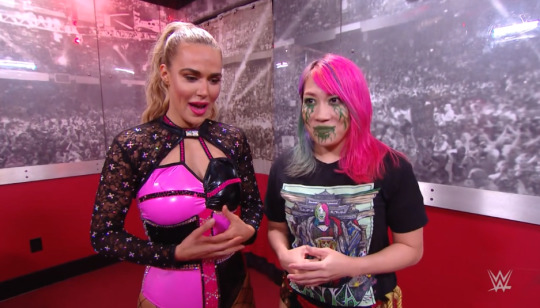
“This Sunday at tlc, it’s gonna be you and me against Nia and Shayna,” Lana says to Asuka, as a quiet ‘woo’ can be heard in the distance.
Lana facing her fears and fighting Nia Jax makes her the bravest person Asuka knows. Rolling. Fucking Asuka. ASUKA. wwe, stop.
Why isn’t Asuka accompanying Lana to the ring?
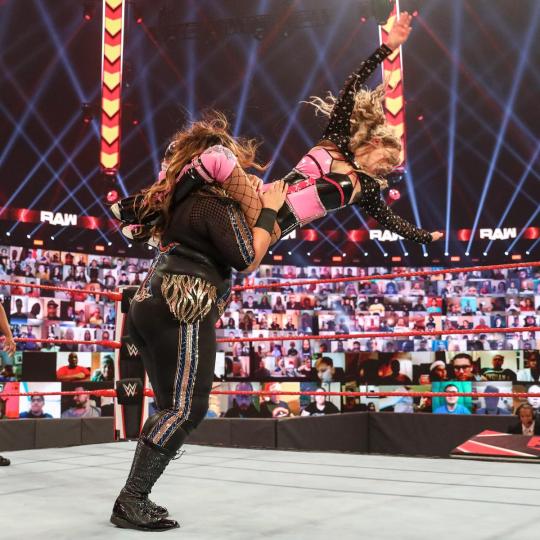
I like Lana’s gear.
Joe just compared Lana to a mosquito, goodbye.
Oh snap look how fast Lana did that headscissors takedown. We’re witnessing her progression, ladies and gents.
You know, I knew Lana would win this match, I knew exactly how she would win this match, but jfc what a treat watching it myself.
Nia’s face lmfao.
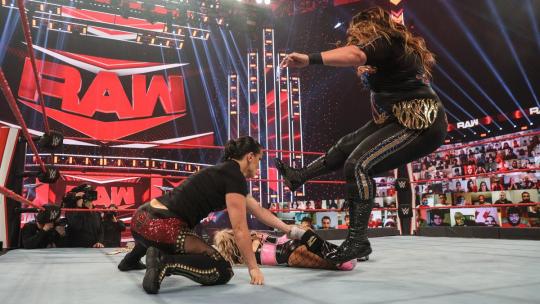
Shayna wrecking Asuka so she can’t save Lana from her inevitable fate. Still curious on whether or not this beatdown injured her, if she was injured going into the match, or if it was all really just a storyline.
Yikes this is sad.
Man that leg drop onto Lana’s ankle actually looked kinda wicked, ngl.
*distant woo intensifies*
Wow we got real tears from Lana. Points.
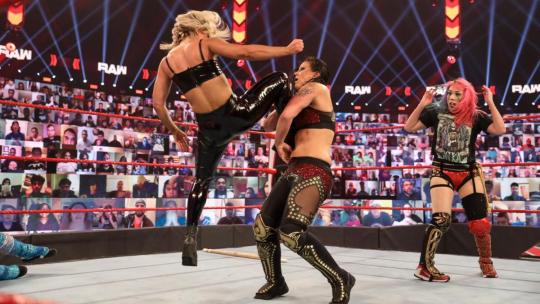
Becky and Charlotte have been gone, Alexa hasn’t been on tv, the Raw women’s championship has become a meaningless prop... what a dead period for this roster.
Hi why is this match happening?
I will never not be impressed by Dana’s entrance.
Is Mandy actually hurt? Why did they take her off tv for so long? Is Shayna the resident kayfabe shelver? “Hey this girl is actually injured, have her written off by Shayna” ?? Cuz I know they’re not splitting Dana and Mandy up, and Dana has been on tv every week since Mandy left. Must be genuine.
These 2 are running roughshod over the entire division at this point.
OH SHIT MANDY’S BACK WITH A KENDO STICK
Lmfao the babyfaces are fucking done with Nia and Shayna. Honestly that’s great, I love it when babyfaces band together to stand up to dominant duos. This has been going on long enough. They took out Mandy, took out Lana, were about to take out Dana. Totally fair.
Highlight: Lana getting a clean win over Nia & being taken out so my queen can return
---
NXT:
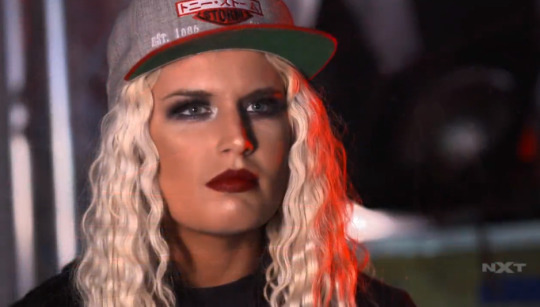
It’s a funny thing with Toni and Rhea. Toni says she’s the reason Rhea came to nxt, but she’s also the reason I became such a huge fan of Rhea’s. Heard they were having some big TakeOver match and everyone was always praising Toni. So I checked into Blackpool solely to see what the Toni Storm fuss was about, and I left that ppv solely impressed by Rhea Ripley. Then I took particular notice of Rhea in the Royal Rumble a few weeks later, and I’ve been watching NXT UK for her ever since (til she moved). To see her growth has been tremendous, and she’s so young. Such a bright future.
The music to this is great.
Toni says she isn’t scared of Rhea, as if Rhea’s mere theme music didn’t scare the absolute shit out of Toni the week prior lol.
Toni’s not even a terrible promo, but the timing of her blinks could not be worse. Yes, it matters.
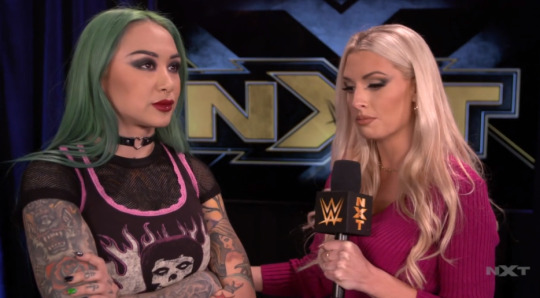
I can’t stop laughing at how fucking intensely Shotzi started this interview.
She does pissed off interviews well. I can feel her annoyance.
Really don’t want to see a Candice/Shotzi feud tbh but okay, I’ll try.
aaand there’s the howl. Awful.
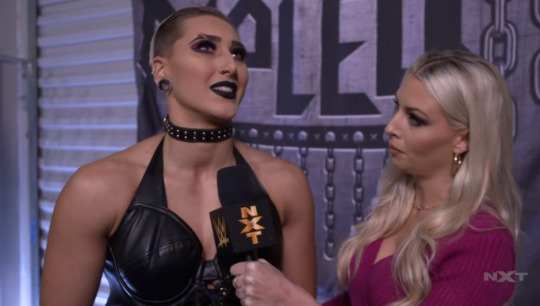
Lmfao Rhea called Toni a piece of trash. This is gonna be interesting to see with the alignments reversed.
I don’t remember who won this match, but I’m betting it was Toni. Which is fair tbh. Rhea is probably on the “put some peeps over before moving up to the main roster” path that everyone in the women’s division walks on. They always eat at least one monumental, or a couple meaningful, loss(es).
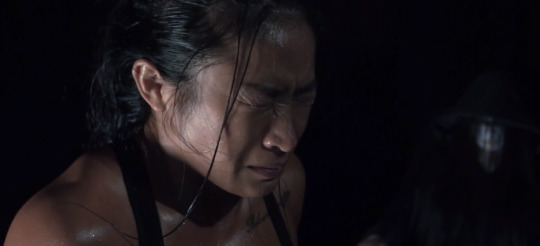
Oh man that is fucked up. To not only be forced to continue punching/kicking a human (fun fact: the person on the offense takes quite the damage doing so) but to have the defenseless victim bleed out and beg for you to stop. That’s rough.
This was shot really well. That music holy shit, I’m creeped out. It’s like a horror movie.
I see the point. Numbs him to pain and breaks his will, while numbing her to mercy. Ruthless stuff.

Oh are we finally done with Indi’s neck brace? Cool.
I can’t believe wwe invested in this upgraded tank. I still don’t think it’d work on the MR, but points to the boss for shelling out the cash.
Wtf was that stumble and “fall” by Indi lmao.
If Candice was a real bully, she’d distract Shotzi by fucking with her tank at ringside.
Indi does need a mentor, she’s a hell of a lot greener than my mutuals have made it sound. oof.
Shotzi looks like she has no idea how to work with Indi, and Indi looks gassed, confused, and slow as hell.
All Indi knows it going from spot to spot while Shotzi waits around for her to get there.
Lol Indi failed at getting a dirty win. I don’t really care if this is a part of her The Way storyline, what a mess.
The only redeeming part of this piss poor segment was Theory shaking the troll’s head at Shotzi.
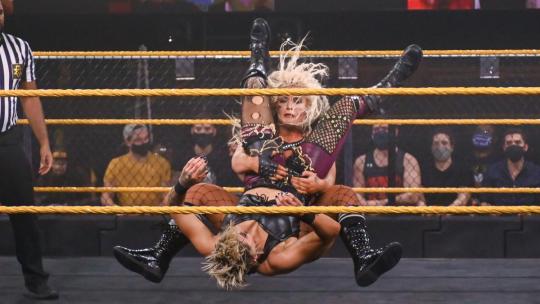
I’ll give wwe an extra $9.99 if they let this match have a clean ending.
“[Rhea] was at one point the biggest superstar in the world,” that isn’t even close to being true because Becky Lynch exists, but I’ll let it slide and pretend you said “in nxt”.
Their paths will be so similar to Becky and Charlotte in the future.
Wow what a sequence. That would’ve received an applause on the MR. Traded headlocks for restholds, threw around their strength, then went into a battle of pinfall reversals. Instead of following that with some stalemate, they didn’t take a breath and proceeded to dance with each other and showcase some chemistry before rolling back into a battle of pinfall reversals. The sequence started with a kick by Toni to Rhea’s midsection, and it ends with a kick by Rhea to Toni’s midsection. Peep that match production, good stuff.
My, my, those slaps to Toni’s back. Whew.
Yeah actually it’s really fucking cool that these 2 get to main event nxt together, come to think of it.
They sell well for each other.
Rhea has the best dropkicks, lesbireal.
Holy shit Toni’s headbutts make my own head hurt. God I wish she wouldn’t. Most people put their hands between the heads so no contact can be made, but Toni’s just like “lol fuck it”
This is a great match. This duo works a lot better with these specific alignments. Watching face Toni try to chop down Rhea is not as good as heel Toni being impossibly hard for Rhea to put away.
Women’s matches and never having a clean ending. Name a more iconic duo. Winter of overbooked women’s matches continues.
Like I had guessed Toni was gonna win anyway, but fucking come on.
*Bonus* online exclusive: Toni says playing by the rules got her diddly and squat, but like... she was a champion lol. “It ain’t even Toni time right now, it’s party time.” Alright.
Highlight: Rhea vs Toni minus the ending
---
NXT UK:

I don’t know why we’re getting Isla Dawn vs KLR but anytime I get to see KLR fight, I’m here for it.
Hell even Isla’s song never kicks it out of first gear. Song has so much potential but it never goes to the next level.
Ahhhh my Scottish queen is here.
No, don’t compare Sasha’s basement meteora to the double knees Isla did. That was pitiful.
Anyway, KLR vs any of the 4hw would be fantastic, take my money. Sasha, Bayley, Charlotte, or the woman KLR wanted to face at TO Dublin, Dublin native Becky Lynch.
That back body drop is horrendous as a finisher. It’s like when Becky won her debut match the exploder suplex. Awful lmao. Imagine if KLR lost to a back body drop ffs.
You don’t get to be this frustrated for not being able to beat the champion when you’ve only been fighting for like 3 mins.
Isla’s pisspoor speed going in the corner, and her pisspoor roll off of KLR’s tornado ddt. Shame.
Such a clean transition from a failed pinfall attempt into a submission by KLR, whew.
This whole match was just a flex by KLR lmao.
There was a time where we had Becky Lynch, Bayley, Rhea Ripley and KLR as our champions. Wow, take me back plz.
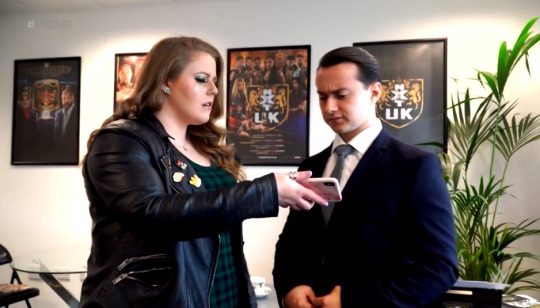
The background music of this stupid recording is so unnecessarily dramatic, wow.
All for the delivery of a chair. Of a fucking chair. Piper... shut up and handle your shit.
For someone so much larger than the little man, Piper is insanely unintimidating.
Highlight: I got to see KLR wrestle
---
Smackdown:
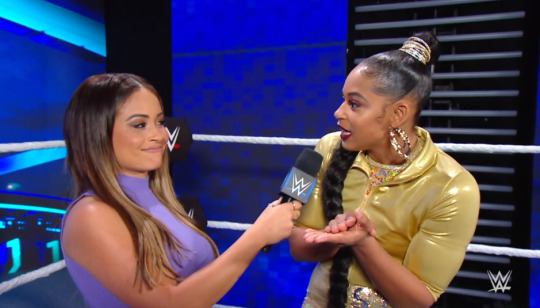
Bayley does run her mouth a lot. She’s kind of the EST at saying dumb shit that gets her into trouble lmao.
Bianca is so friggin good at interviews and in backstage segments. She hasn’t received much of a chance to do promos in the ring, let alone obviously to a live crowd, but I hope she shines there, too.
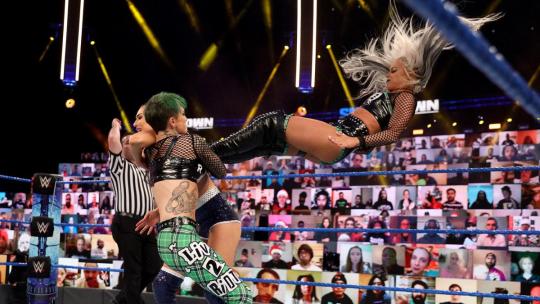
Has Liv reverted back to being a dumb blonde, or is it drugs? Stop letting her speak.
Love Riott Squad’s everchanging gear. Wonder who makes it for them.
Billie Kay claims that she’s a ‘seasoned’ ring announcer, and somehow that would not surprise me.
Tamina “get the fuck out of my face until I get a nap and a vat of coffee” Snuka, everyone.
Lmfaooo Tamina fucking chucked Liv across the damn ring. What a good job by Liv.
Ruby is exceptional at running the ropes. She gets a good spring off of it.
Tamina’s hair is always so beautiful, she gets points there.
Dropkick into a faceplant. Billie Kay gets pinned rofl. She’s so bad at wrestling and yet here I am ridiculously entertained.
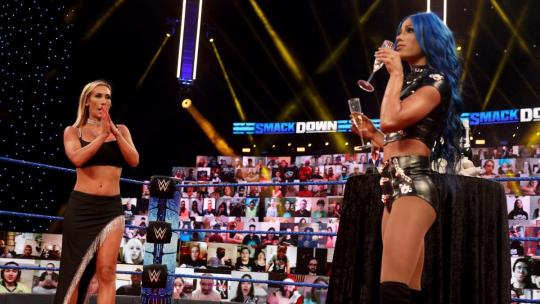
There’s absolutely nothing wrong with Carmella’s current persona, but man I wish she’d come out in a cut off tank top, camo pants, high tops and a printed hat.
I mean people are at home cuz covid, but go off.
Aye putting over Sasha. Good heel Mella.
Sasha has held the title for like a whopping 2 months and we’re already marking calendars. Sad.
In kf, Sasha is kind of mentally weak, so I’ll give Mella that. I’m not sure what it’s gonna take to shake that perception, either.
“Who is Sasha Banks if she’s not the Boss? Who is Sasha Banks if she’s not the best? It’s sad because that’s a question that not even Sasha Banks knows the answer too.” So I get that wwe are trying to help Sasha develop and fight off her past demons, but man these women are ripping her a new one. Sasha’s only 29 so she can grow and develop however she wants, but jeeze. Salt, meet the dagger Bayley stuck in Sasha’s back.
I like Mella cuz she knows how to hype her opponent’s accolades and strengths while cutting an immaculate heel promo where she hits them RIGHT where it hurts. She’s a pro. Heels should take notes.
This music is like the Jazz Vibes playlist I always listen to.
She just called Sasha cheap and frantic lmaoooo
Oh damn Sasha be out here looking like MONEY. That girl has style, even if it doesn’t always hit with me, she got style.
oof the crack of that slap to Reggie.
OOF the crack of the bottle shattering over Sasha’s poor back. rip.
Match at TLC should’ve been a champagne match. That entails whatever your mind comes up with; pouring alcohol on your opponent, dumping their head in a bucket of ice, breaking bottles over spines. It don’t matter.
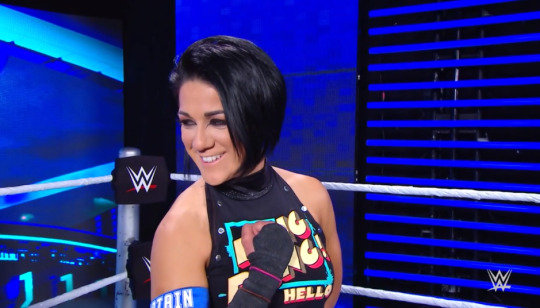
“You don’t see me going around here bragging about how damn good I am,” lmao WHAT. Bayley is equal parts delusional and obnoxiously annoying.
One size heel does not fit all, but I think her version suits her beautifully.
If I were her I’d pick your brain too, but I’d also want a match, cuz people leave matches with you looking as good as humanly possible. Equal parts selfless as well.
She didn’t lie, this was absolutely her putting Bianca on the map on the main roster.
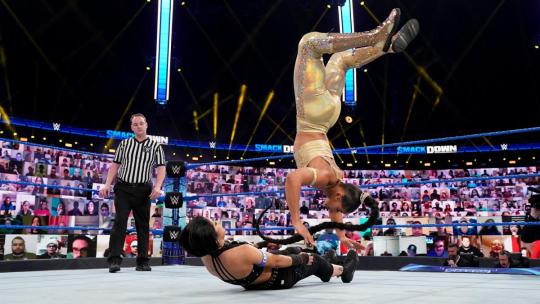
wwe: wants to strap a rocket to Bianca and make her a star. Also fucking wwe: “lol no we���re not gonna show you her full entrance, cry more scrub.”
Bayley still looks weird without a title.
Bayley mocks Bianca’s entrance and then gets swept onto the apron lmao. Idiot.
Bianca is a lot of flash and showboating, which is great from an entertainment standpoint, but she needs to do a little... less.
Fantastic snap of the hand against the led board. Bayley wrecking Bianca’s arm gonna hinder the flips.
“I’m the ER. I’m BET-TER. haha.” lmao Bayley is such a fucking dork. Got sent into the ring steps for her bravado. Love that there’s always immediate repercussions for Bayley’s arrogance.
Bayley turned midway going down onto Bianca’s knee for that backbreaker, there. Hope she doesn’t have a massive bruise. Looked like it’d leave a massive bruise.
3 things I’ll apparently never get to see again: Bianca’s hair whip, Bianca’s full entrance, and Bianca’s 450 splash. I’m tired.
These stupid fucking squats while Bianca is dangling off the top rope rofl I swear Bayley is something else. Girl knows how to entertain. “Bayley got a bit cute and Bianca made her pay,” story of Bayley’s life.
Beautiful spinebuster by Bianca. At least SOMEONE in the women’s division will use it.
Bit of a miscommunication there it seems. Bayley goes for a B2B, Bianca tries to block it, Bayley drops down to dodge and go for a cradle. She rolls Bianca all the way back, stands up and hesitates before running at Bianca with an elbow - even though Bianca is not in position to receive it - which Bianca counters by rolling Bayley up, but it was super obvious Bianca was just scouting the next spot. Bianca goes to pick her up for a powerbomb but Bayley has to kick out twice to prevent herself from being pinned while Bianca tries to lift her. That entire sequence was super messy.
Then Bianca nearly drops her lifting her all the way up lol. Yikes. Gotta be pretty fluent to pull that off. Not to plug my fav (but I’m totally gonna plug my fav); it’s a move Charlotte does in almost every match against Asuka or Becky, and you gotta be not only built to pull it off, but you need to have impeccable timing to make the transition look smooth. Extra points if you lift them off the mat RIGHT before a 3 (which Charlotte usually does)
Anyway, good match with a messy last 2 sequences. Bayley did what Bayley does best.
Highlight: Bayley vs Bianca
---
TLC:
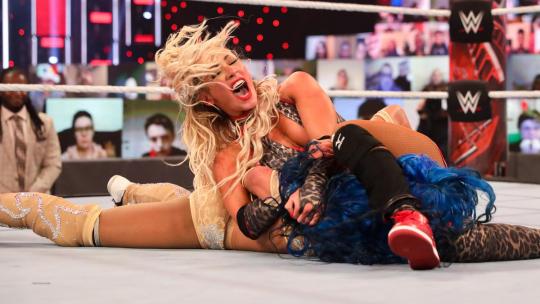
They really took Eva Marie and Sasha Banks’ characters and meshed them together while keeping Carmella’s obsession for animal print lol.
Really don’t like that gear. That’s a miss, Mikaze.
Beautiful arm drag. Sasha taking the idea of wrestling like a Lucha more seriously? Cuz she should, ain’t nobody else in the MR doing it.
Commentators say the trash talk is continuing, I say Sasha is quietly leading this match with a grimace. Peeped that “hit me”.
Carmella goes to suicide dive through the ropes just for Reggie to catch her, cept she got caught up and started turning in midair. Would’ve hit her neck and shoulder HARD had he not been there. Great catch indeed.
Sasha “rip my back” Banks.
Not to be douchey, but if you have to adjust your gear in the middle of a match and it’s not just to fill time or be used as character work, then you need to redesign your gear.
Sasha’s a great babyface once that bell rings man. I wish she could carry that energy everywhere.
Holy fuck that facebuster. SPIKED her head, oh my god. I have never seen anyone make a facebuster look so impactful. Points if intentional.
Oh the timing of Sasha blocking that superkick from legit connecting. God she’s good.
You know how I know this is a good match? I’m watching some of these near pinfalls and submissions knowing damn well Sasha’s gonna win, yet my anxiety is still spiking thinking Carmella might walk out with the title. I KNOW she doesn’t though lmao. Good sequences, believable offense, great near pinfalls. They work well together (I’m not surprised, Mella and Sasha both work well with almost anyone)
What a fantastic transition into the bank statement. Points.
That match should’ve ended by dq the second Reggie pulled Mella out.
Sasha could’ve sold that double superkick pinfall attempt a little bit more.
Carmella having a breakdown. What does that mean? That means she’s about to lose this match lmao. There it is, not even 10 seconds later hahaha.
Sasha sells pain so damn well. Good for her. Good defense of her title. Points to Sasha, she’s phenomenal every time she has an actual match. Post-match and she’s already annoyed me though lol. Ugh. Maybe she’ll get it soon enough.
Nice “replay” wwe. Billion dollar company btw.

Billie, drawing a horizontal line is not how you write ‘clairvoyant’.
“proficient in Japanese” aw Asuka was so excited for a split second lmao.
Oh no, she made a mask to match Asuka’s with a paper plate. Oh no no no. Travesty.

Ugh I’m so excited. I’ve already seen this and yet I’m excited. Here we are, the whole damn reason I started catching up on everything I basically refused to watch since June 22.
SHE LOOKS LIKE MONEY, WHEW. The queen IS back. She’s so fucking beautiful man.
Love how annoyed Nia looks. This is your comeuppance tbh. Could’ve just faced a measly Lana, but no, you had to play too much.
Really Charlotte shouldn’t be in the tag division, and really she shouldn’t give half of a fuck about Asuka, but we’ll get to that more in the future since this is already nearly 2 months old.
Nia’s doing a great job selling Charlotte’s return, and she’s not even active in the match rn. She does good work.
Bad camera angle on Asuka hitting the ring post.
Asuka getting wrecked lol.
I really despise that the Raw women’s championship was tied up in all of these storylines that have nothing to do with the Raw women’s championship. The Lana crap, the Charlotte crap, the tag teaming in general crap.
In hindsight, I now find it curious that Ric Flair was in the back for this match. Very curious. I swear, if the past 2 real time months weren’t a part of some master plan the Flairs came up with together, I will be SHOCKED.
Charlotte’s fucking crazy for doing those moonsaults to the outside though, for real. I know she was a gymnast and an exceptional cheerleader, but MAN you could not pay me to do fucking blind back flips that high up. Crazy.
She should’ve given us a spear in this match. I wanna go rewatch her work just to see some spears.
Good match. They needed to not focus on destroying Asuka for as long as they did, pacing was off for a little bit there.
Love how Charlotte sticks her tongue out when she bridges up into the figure 8. She’s such an asshole lmao.
If I could’ve changed one thing about that finish, I would’ve had Charlotte bounce off the ropes before hitting Natural Selection. Other than that, it was great.
Charlotte looks good with a title, idk *shrug*
The way Charlotte looked over at Asuka though. I really don’t trust her in hindsight lol.
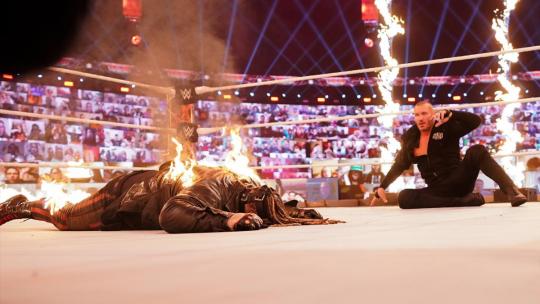
Like how this Firefly Funhouse is setting the spotlight on Alexa before Bray takes his leave of absence, only wish she hadn’t missed 2-3 wks of tv.
What a fun way of running a video package.
Inferno matches are insane and I’m not sure why anyone would participate in such.
Think it’s smart they’re both leaving their jackets on tbh.
Alright that was cool. The way Fiend called up the flames was fucking cool. It looks amazing aesthetically. They could’ve never done the set quite like this if there had been fans.
WE HAVE STRAPS?! IS FIRE NOT ENOUGH?!? Man. Randy is a fucking trooper.
Guys. Guys excuse me, that strap is on fire, can... can we not, please??
Man is swinging a god damn pick axe at Randy Orton, I--
I hope that wasn’t actually flammable liquid cuz otherwise Randy is now soaked in it, and that’s insanely dangerous. Oh that’s great editing. So it was flammable, but Randy was out of the chair before the fire rushed at him. Also covered the chair in blood. That was cool.
Orton just pull the damn string out of the jacket real quick lol.
Caught Orton’s attempt at an rko with a mandable claw. Points.
Can someone... put him out? Editing trick? Were the flames real? Am I real??
Shouldn’t the bell ring? Match is over, right??
The dummy was kind of obvious ngl. Not to sound like an asshole, but they should’ve made it a bit thicker and more solid lol. Doesn’t really take me out of it though, cuz even though I’m sure it was a stunt double that got lit on fire by the ramp, someone was on fucking fire, and that’s intimidating in itself.
Also the dummy is melting. I’d say they should’ve used pig meat, but I’m sure vegans and animal rights activists would’ve had a field day writing to Snickers about that.
Was a good match, for what it was. I was entertained.
---
*BONUS*
Main Event:
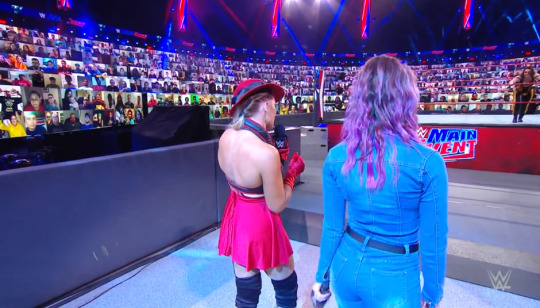
“Nasty Nikki” lol okay.
“The only reason people even know you exist is because you were Alexa Bliss’ best friend,” ouch. Truth is pain.
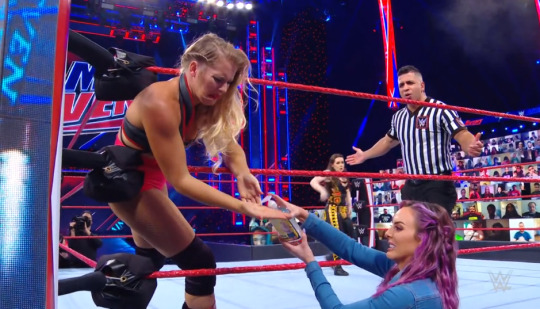
Ahahahah Lacey has hand sanitizer again.
Love that submission Lacey jumped into through the ropes, plus an eye rake. Fantastic.
That’s curious. Lacey and Peyton are arguing over the hand sanitizer as Lacey wants to squirt it on Nikki, while Peyton is claiming it’ll get her DQd. Now I’m on Peyton’s side in the sense that it should absolutely be illegal, but Lacey’s done it in a match against Nikki before, sooo ???
I like how Nikki fell trying to get back into the ring before the 10 count. Adds credibility.
Haha Nikki gets the pinfall over Lacey because Peyton was being a nuisance on the outside. Lacey big mad. That’s great.
---
*Smackdown easily shined the brightest in what was a great week of wrestling. Utilized 8 women in 3 different storylines, couldn’t possibly complain about that.
#wwe#issa review#feel free to ignore these#cuz who tf cares lesbihonest#today's props goes to:#charlotte flair
3 notes
·
View notes
Text
quarantine tag game
thanks for tagging me @weweregoddesses !
are you staying home from work/school?
yes i am! im lucky enough to go to a private school and we use ipads for a lot of work anyway, so it just took a couple days to get everyone adjusted to online classes
if you’re staying home, who is there with you?
my mom, dad, and sister!
who would be your ideal quarantine mate?
my girlfriend @friendlyneighborhoodloki
are you a homebody?
y e a h definitely. i miss hugging my friends everyday and going to the mall but i do like having an excuse to stay home and chill
an event you were looking forward to that got cancelled?
SO. MANY. THINGS. senior prom, senior events at school, two dance shows I was performing in, a BTS concert, my 18th birthday party, grad parties and my cousin’s wedding- anyways. there’s a lot
what movies have you watched recently?
not a lot actually... i rewatched Knives Out and Avengers Endgame the other day. I did finally see Little Women! I watched a couple of shorts on Disney (highly recommend! they’re called Kitbull and Piper) I’ve actually been watching more of the extra content like behind the scenes work or director’s commentary. I love that stuff
what shows are you watching?
again, not as many as i would’ve thought, but i’ve been catching up on Psych! Im in the middle of season 5, I believe. I’ve just had it playing on my laptop while practicing my hand embroidery. I also watched a few episodes of Next In Fashion and Lucifer around the beginning of quarantine, but it’s been only Psych since then. I have also been watching a little bit of Run BTS! when I have time for longer episodes
edit bc it took me forever to finally post this: i started the Night Manager. Tom Hiddleston is 👌🏽🥵
what music are you listening to?
mostly BTS. a fair bit of Lauv, P!nk, and Ed Sheeran, Post Malone, and Hayley Kiyoko. A little bit of Bastille, Alessia Cara, Vian Izak, Isak Danielson, Billie Eilish, and Sia. I’ve got mixed playlists but most days I’ll honestly just have BTS’s MotS: 7 album playing on repeat
what are you reading?
Not as much as I’d like. The Things They Carried, A Darker Shade of Magic, a couple webtoons. Tbh that’s it
what are you doing for selfcare?
allowing myself to spend time on skincare, trying to eat regularly even though I have a borderline ED, painting/drawing, hand embroidering, pressing flowers, practicing self portraiture photography + modeling with my tripod and camera, making myself food/helping my parents cook, browsing youtube videos with art and soothing music, having video chat sessions with my therapist, trying (and failing, but at least im trying!) to keep up with my iontophoresis treatments, facetiming/texting friends and playing online games with them, facetiming/texting my girlfriend
tagging: @friendlyneighborhoodloki @mypeculiarparadox @isuckatmath03 @thatonegaychickoverthere @skittles-rainbow-cat @lonelyaroace
and all of you! if you’re seeing this and haven’t done it, consider yourself tagged!
6 notes
·
View notes
Text
29
okay so confession time i haven’t ever watch the name of the doc, the day of the doc, and the time of the doc in their entirety
the name of the doctor
circa ??? technically it’s all over the place including at his grave in the far future??? but he’s a time traveller so it could also be anywhere i give up
it’s gonna be here bc it makes sense to not separate these next 3
i gotta say it’s really interesting how obsessed with the doctor’s death they were with 11 and i like that we let that go so far that chibs was like screw the future let’s blow open the doctor’s timeline in the OTHER direction
river :’))))
again kudos to jenna coleman for just taking whatever stuff they throw at clara in stride bc honestly this is only the beginning from what i recall
the day of the doctor
circa a bunch of times
listen this ep is SO long and then we have time of the doctor also compare that to the 80 million and a half ten specials
listen whenever 13 regenerates i demand and deserve like 3+ hours of content leading up to it
rose!!!
i’m sorry is that a gallifrey maypole
listen they can redeem this queen elizabeth portrayal if they let 13 meet her (in case you didn’t guess that’s another slide in the powerpoint)
i’m sorry gallifrey being like ‘not these bitches again’ every time the doc comes sticking their noses in will never not be funny
this episode is just excellent it hits so many notes and does them well
i’m gonna need a moment to get over billie piper’s fucking smile
oh my god i recognize those eyes hello to 12 early!
i also just want to congratulate smith bc sure there’s two other doctors but this is still his era and his ballgame and he just always brings it home
the time of the doctor
circa no particular time again
so to be fair this episode makes v clear the level of awareness they had about clara’s crush like she invites the doc to be her fake boyfriend for christmas and the truth planet basically makes her say it
now i’m thinking about how 11 lived an entire life on that planet
u see moff pulls random timey wimey stuff cuz it looks cool but then i’m left here thinking ELEVEN LIVED AN ENTIRE LIFE IN CHRISTMAS and he’s been doing shit like that for 3 seasons no wonder the bitch is ready to rest
when baby amelia showed up with the drawings that was like a punch to the gut
oof i can’t get over the blink and you’ll miss it change into 12
i love how every time the doc changes the tardis is just like i dunno know suddenly i can’t read fly
into the dalek
circa 2014 but i think it may actually be the future idk
i really like when they tackle dalek morality bc i feel like they do it well
like there’s no doubt that daleks are evil they don’t budge on that front but they do investigate obviously redemption, prejudice, the way the doctors (and us) r reflected in what the daleks become
idk it just is one of the most black and white villains in doctor who and they find so many layers in it even so
also this early on i can see how much 12 grows oh man i love 12 so much
#chronological chaos#thoughts#tnotd#tdotd#ttotd#i would like to speak to a manager about those titles too#itd
1 note
·
View note
Text
Safe Haven, Pt. 1
A/N: Billy moves into the house across the street from Piper, a girl with a mysterious past.
Timeline loosely follows Season 2 and disregards certain elements of Season 3.
Disclaimer: I don’t approve of, or excuse some of Billy’s behavior. I just enjoy how well exicuted the character is and its interesting to write for him.
Chapter 1
The town of Hawkins, Indiana was always a bit peculiar. Strange things always seemed to happen there and they got stranger every day. This story begins in October of 1967. That’s when I was born. My mother was a scientist and researcher in a very top secret government lab that was housed in Hawkins. Cherie Lindell was her name, she and her sister, Diane, grew up in Hawkins. My father's name was Jeff Callahan and he went to school with my mother. And they were different as different could be. My mother was a science nerd, anti-social and completely lost in her own world. My father played football, and was incredibly mechanically inclined and took auto shop basically every period his senior year, or so I’m told. But somehow they found their way to each other and managed to form a strong relationship and managed to keep that going while my mother was away getting her degree and my father stayed in Hawkins growing his auto shop and becoming a pillar of the community and all that. By the time my mother graduated and secured her government job, my father had bought a two story house with a white picket fence for the two of them to grow into together. Not long after they were married and I was on the way. That’s when things began to get a bit dicey.
The project that my mother was working on was so top secret, so secret that not even my father knew. But the lab was working on human experimentation working to develop mental and psychic abilities. My mother allowed herself to be experimented on while she was pregnant with me. And that is how I, Piper Callahan, was born with some scary abilities. To be exact telekinesis and empathic tendencies. As a child I Thought it was normal. I thought every other child could do the things that I could and I never questioned why I was homeschooled and the only places I ever went, were to my aunt Diane’s and uncle Jim’s house, and my moms lab. And that's when the bad thing happened. I was seven years old, I didn’t have good control of my abilities and I was throwing a tantrum. A big one. Things flying around the room and a side table hit my daddy in the back of the head. After that I spent a lot of time alone. And then Diane and Jim convinced my mother to put me into the public school system. My powers seemed to be gone after the bad thing. Or so I let everyone believe. The only people that knew were my mother and the doctors at the lab. They were stupid and easy enough to convince. I grew and had a relatively normal childhood and a normal adolescence. A rough transition through puberty and all that good stuff. I mourned the death of my cousin and watched my aunt and uncle's marriage fall apart. My aunt moved away from Hawkins and got remarried. We didn’t talk much. My mother went off the deep end and almost never came home. I found solace in my uncle. Uncle Hop as I so affectionately called him. He was the chief of police. He knew of my abilities and believed they were gone. I never wanted anyone else to know about me ever again. We spent a lot of time together and I took care of him more than he took care of me. I had plenty of friends at school. I was a floater and liked by almost everyone. Nancy, Steve, Barb, Jonathan and many others. I was intelligent, athletic, artistic, good with cars like my dad. I became someone that I like. And then the next bad thing happened.
The disappearance of Will Beyers. A tragedy felt by almost everyone in the community. And at the same time I felt another presence in town. A familiar one but I couldn’t place it. A lot of crazy things happened. Monsters sneaking their way around town. Mysterious disappearances. My friend Barb, taken into what seven year old me called “the scary place.” And then with a series of insane events Nancy, Jonathan and I ended up meeting up with Nancy’s brother and his friends. And the familiar presence. She was eleven. I had been number one. Soul sisters in a project that should have never existed. She was untrusting and skittish. She could barely speak in coherent thoughts. She must have been kept in almost total isolation. Focusing on growing her powers. She was younger than me. Younger than Mike and the other kids. Maybe twelve. I didn’t want to reveal my powers I didn’t want anyone to know. But I pulled her aside and i showed her the number on my arm as well. She touched it with her fingers, then my face, “Sister,” she said and smiled, “Pretty.”
“Sister,” I repeated. “You’ll keep my secret?” I asked her.
She looked confused.
“I can’t do it anymore. I’m broken. No one but you knows.” I said to her.
“Sisters keep secrets.” She said determined.
We found will. Saved the day. Defeated the bad guys and all that jazz. After the commotion eleven disappeared. I told Uncle Hop everything. And together we were able to find eleven in the woods and she came with us. Hop had a cabin in the middle of the woods. Almost no one knew about it and we knew she would be safe there. As time went on I began to let El in on the secret that I still had my powers and made her promise not to tell anyone. It was dangerous for all parties involved if anyone found out about my abilities. Together we worked on controlling and growing our gifts and Hop was happy we had each other. And I was happy that she had Hop. I loved El and she adored me right back. Things looked like they were going to be ok.
I hadn’t seen my mother in over a week. She hadn’t come home from her lab and I was sure at this point she had her own apartments deep within the sub levels. Across the street a moving truck pulled into the driveway of a previously vacant house. After that a station wagon and a sexy ass blue Camaro. I was sitting on the couch in my living room, not even trying to pretend to not be staring at the car. And the boy that got out of the car was just as sexy. From his boots up to the ass hugging jeans. To the button up lazily tucked in and the leather jacket. And god the hair on that boy. He saw me looking and I didn’t even care. He raised an eyebrow and cockily smiled at me and gave a little wave. I didn’t return any of the gestures but hopped off the couch, ran upstairs to my room and put on my own ass hugging jeans, a black Harley t shirt, my chucks and looked at myself in the mirror. Delicious. I thought to myself. I had quite a reputation around town that I did thoroughly enjoy. Everyone said I reminded them of Stevie Nicks if she had dark hair. So if mother Stevie was the white witch then i was the Black witch. My skin was very fair, and my hair was a stark contrast, it was nearly black and my eyes were electric green. I was incredibly petite but my small stature was nothing in comparison to my aura. I won’t lie, I used my telekinesis to make my hair float about and make me appear lighter on my feet. I flittered down into the kitchen and thanked the almighty that i had the gumption to bake cookies earlier that morning. I piled the chocolate chunk cookies onto a plate and headed out my door and across the street. The first person I met was the daughter, “Welcome to the neighborhood neighbor, I’m Piper.” I offered her a cookie which she took.
“I’m Max.” There was rustling behind her, she turned around and saw the guy I watched get out of the Camaro earlier. “That’s my brother, Billy. Or Jackass, whichever suits you better.” She said just before turning around to carry another box inside the house.
“Cute kid, you must be the luckiest big brother ever. Would you like a cookie, Jackass, was it?” I joked.
He clenched his jaw briefly and then cracked a smile, “I think Billy will do just fine beautiful.” He said snatching a cookie from me. I held my hand out for him to shake and when his skin touched mine I felt a powerful emotion practically kick me in the stomach. Suffering, pain, loneliness, sadness, anger. Violent rage. Lust, insecurity. A lot to unpack for sure. I didn’t know what could cause so much pain in someone the same age as me, save for my own experiences. A cold and steely voice broke our eye contact.
“Can I help you?” The man said. I assumed Billy and Max’s father. Quite the unpleasant man. I immediately noticed that when he approached Billy seemed to shrink. He seemed smaller, eyes cast to the ground. I immediately didn’t like him. “Hi, its nice to meet you. My mom and I live across the street. I’m Piper Callahan, I brought you cookies.” I said as I held out my hand for him to shake. Again when the skin touched my hand, a gut punch of feeling. Primal rage mostly. And black and sticky evil. I understood so much more about Billy now. And I was worried for the rest of the family. His wife came around the truck and we went through the same process. I got almost nothing from her. She was almost like the shell of someone who used to be a person. She took the cookies and disappeared into the house. Her husband soon after her. Max reappeared from around the backside of the truck. I said to her, “It was real nice meeting you Max, I live mostly alone over there, my mom works a lot, if you ever need anything, girl time, a sleepover, a ride to school, just come over ok? My car is cooler than your brothers by far. And my motorcycle is even cooler than that.” She smiled at me and thanked me before disappearing again with another box.
“That was awful nice of you,” Billy said quite flirtily. “Thanks for stopping by. Will I be seeing you around school?”
“You’ll be seeing me, Billy.” I said, gently flirting back at him. I had a rule, I wasn’t going to ever get close to anyone. I didn’t want another bad thing happening. I couldn’t bear to know that I hurt someone else close to me again. But god damn was he a specimen. And there was no shame in some harmless flirting. “Will you let me see the insides of that beautiful beast you have down there?” I said motioning to his car.
“I think that might be a little out of your league princess.” He said.
“Oh sugar, I bet you I know more about it than you do. I have a ‘69 impala up in the garage and my dad was a mechanic. He died when I was seven but I inherited the talent from him. The guy that owns his shop now is great, I work there on weekends and in the summer. Pop the hood?” He looked behind him quickly and walked down the slope to the road. He opened the door and popped the hood. I opened it and looked inside. I whistled. It was a gorgeous and nearly immaculate block. But it looked like his ignition cable was a little loose. “You ever have problems starting her up? Mostly just when its cold?” I asked him.
“How’d you know?” He asked actually surprised that I seemed to know what I was talking about.
“Come here I’ll show you.” When he came around the front I pointed to the cable. “You see the screw you have securing the ignition cable? It’s the wrong size and its not attached properly. Which isn’t really that big of a deal, but when its cold and the metal shrinks up the connections aren’t as good. So it's a little harder to start. Bring it up the driveway later and I can fix that for you.”
“I don’t know...were kind of busy unpacking and all. Neil might not let me.”
I reached up and stroked his cheek, a spark of softness beifely shot through him. I could feel it. It made me wonder how long it had been since he had had any true compassionate human interaction. I’m sure he was having physical contact on the regular of the good and not so good variety. But something so gentle and kind, I wasn’t sure about. He seemed a troubled person but something in him sparked something in me and I knew in my heart I wouldn’t be able to live with myself if I didn’t try and show him some compassion and genuine human contact.
“I get it, its ok Billy. Same goes for you by the way. If you ever need anything, a ride to school, some girl time, a sleepover,” I paused and became a bit more somber when I said, “somewhere safe, to escape too. I’ve got the space and I don’t like being alone all the time. So really you’d be doing me a favor.”
I didn’t let him respond before sauntering back off to my side of the street, swinging my hips back and forth the entire way. Before I walked back inside the house I turned around, Billy was still looking at me. I wiggled my fingers at him before spinning around again and walking inside and shutting the door behind me. I was worried. I’d hardly met the family, but I knew that things were off. I knew that BIlly was going to be trouble, that he was trouble. I knew the kind of guy he was. Hard on the outside to hide the sadness that was inside him. Taking it out on other people. I was going to have to watch out for that. I was going to have to be careful not to get to close. None of the boys in Hawkins could ever tempt me like I knew that one out there could do. But that wasn’t the thing I was worried about the most. I was worried about that little girl, Max. The same age as El. I was worried she would be the next punching bag for Mr. Hargrove
#stranger things#stranger things 2#stranger things 3#stranger things imagine#stranger things fanfiction#stranger things fic#stranger things fanfic#billy hargrove#billy hargrove imagine#billy hargrove fic#billy hargrove x ofc
4 notes
·
View notes
Photo
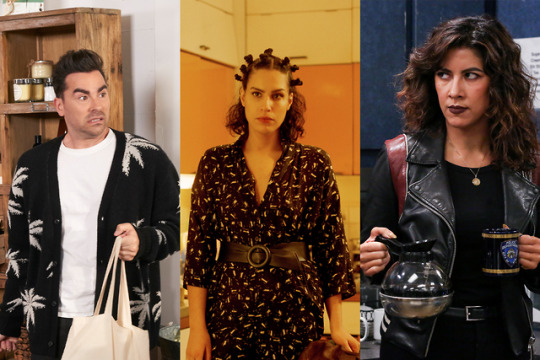
How TV Is Putting the ‘B’ in LGBTQ — And Why It Matters – Rolling Stone
“Mom. Dad. I know you don’t want to talk about this, but I do. I might get married to a man, like you so clearly want. And I might not. Because this is not a phase, and I need you to understand that. I’m bisexual.” That’s Rosa Diaz (Stephanie Beatriz), Brooklyn Nine-Nine’s resident no-nonsense detective, pouring out her heart to her parents in the show’s landmark 100th episode. To which her dad (Danny Trejo) stoically replies, “There’s no such thing as being bisexual.”
Beatriz, who is bisexual herself, wrote in GQ: “When does it end? When do you get to stop telling people you’re bi? When do people start to grasp that this is your truth? …When do you start seeing yourself reflected positively in all (hey, even any?) of the media you consume?”
There’s a real cognitive dissonance to identity erasure. You can be standing right in front of someone telling them exactly who you are, and they can just look right through you, and intone, like a Westworld robot, “That doesn’t look like anything to me.” Nevertheless, it’s a daily reality for LGBTQ folks, and bi- and pansexual people in particular. (The term pansexuality, which has come into wider use in recent years, intends to explicitly refer to attraction to all genders, not just cisgender people — or, as self-identified pansexual Janelle Monae put it in Rolling Stone last year: “I consider myself to be a free-ass motherfucker.” However, many in the queer community define bisexuality the same way. You can read more about that conversation here.) Until recently, sexual and gender identities that existed outside the binary have been anathema to mainstream culture — and often, even, to more traditionalist branches of gay culture.
For a long time, people who identify as bisexual or pansexual didn’t have a whole lot of visible role models — particularly on television. But as our understanding of the LGBTQ spectrum has become more diverse and nuanced over time, there’s been a blossoming of bi- and pansexual representation. In the past few years, characters such as Rosa on Brooklyn Nine-Nine, David Rose on Schitt’s Creek, Darryl Whitefeather on Crazy Ex-Girlfriend, and Leila on The Bisexual — to name just a few — have been at the forefront of a bi- and pansexual renaissance on the small screen.
But it wasn’t always this way. Even after television began to centralize gay characters and their experiences — on shows like Ellen, Will & Grace, Queer as Folk, and The L Word — the “B” in that alphabet soup fell to the wayside. Bisexuality was seldom mentioned at all, and if it was, it existed chiefly as a punch line — an easy ba-dum-CHING moment for savvy characters to nose out someone who wasn’t as in the know as they were. On Sex and the City, Carrie Bradshaw called bisexuality “a layover on the way to Gaytown”; and on 30 Rock, Liz Lemon dismissed it as “something they invented in the Nineties to sell hair products.”
Even some of the earliest shows to break ground for queer representation didn’t factor bisexuality or pansexuality into their worldviews. The designation basically didn’t exist in the gay-straight binary world of Queer as Folk, and was largely seen as a phase on The L Word. Buffy the Vampire Slayer gave many TV viewers their first-ever depiction of a same-sex relationship in 1999 with the Wicca-fueled romance between Willow Rosenberg (Alyson Hannigan) and Tara Maclay (Amber Benson), but the show too neatly glossed over Willow’s years-long relationship with her boyfriend Oz (Seth Green) as a fleeting step on the way to full-time lesbianism. Or, as Willow succinctly put it in Season 5: “Hello! Gay now!”
Characters who labeled themselves as bisexual were considered to be confused at best and dangerously promiscuous at worst. On The O.C. in 2004, Olivia Wilde’s bi bartender character, Alex Kelly, appeared as a destabilizing force of chaos in the lives of the show’s otherwise straight characters. On a 2011 episode of Glee — a show which, at the time, was breaking ground for gay representation on TV — Kurt Hummel (Chris Colfer) savagely shot down his crush, Blaine (Darren Criss), when Blaine mentioned that he might be bi: “‘Bisexual’ is a term that gay guys in high school use when they want to hold hands with girls and feel like a normal person for a change.” By the end of the episode, Blaine assures Kurt that he is, don’t you worry, “100 percent gay.”
One of TV’s first enduring portrayals of nonbinary sexual attraction came with the entrance of Captain Jack Harkness (John Barrowman) into Russell T. Davies’ 2005 Doctor Who reboot. (Davies also created the original U.K. Queer as Folk.) The time traveler swashbuckled into the series to equal-opportunity flirt with the Doctor (Christopher Eccleston) and his companion Rose (Billie Piper), because, as the Doctor explains, “He’s a 51st-century guy. He’s just a bit more flexible.” Captain Jack went on to feature in his own spinoff series, Torchwood.
Then came Callie Torres on Grey’s Anatomy. Portrayed by Sara Ramirez (who came out as bisexual herself in 2016), Callie had a seasons-long arc that spanned from her burgeoning realization of her bisexuality in 2008 to her complex relationships with both men and women over the years. Callie’s drunken rant from the 11th season would make a great T-shirt to wear to Pride if it weren’t quite so long: “So I’m bisexual! So what? It’s a thing, and it’s real. I mean, it’s called LGBTQ for a reason. There’s a B in there, and it doesn’t mean ‘badass.’ OK, it kind of does. But it also means bi!”
Once the 2010s rolled around, representation began to pick up steam. True Blood’s Tara Thornton (Rutina Wesley), The Legend of Korra’s titular hero (Janet Varney), Game of Thrones’ Oberyn Martell (Pedro Pascal), The Good Wife’s Kalinda Sharma (Archie Panjabi), and Peep Show’s Jeremy Usborne (Robert Webb) all were portrayed in romantic relationships on both sides of the binary. But these characters’ sexual orientations were seldom given a name.
In some cases, this felt quietly revolutionary. On post-apocalyptic CW drama The 100, for example, set a century and change in the future, protagonist Clarke Griffin (Eliza Taylor) is romantically involved with both men and women with no mention of labels. Because on the show’s nuclear fallout-ravaged earth, humankind has presumably gotten over that particular prejudice. On other series, however, not putting a name to the thing seems like a calculated choice. Take Orange Is the New Black, a show that has broken a lot of barriers but steadfastly avoids using the B-word to describe its clearly bisexual central character, Piper Chapman (Taylor Schilling).
A few years ago, though, tectonic plates began to shift. On Pop TV sitcom Schitt’s Creek, David Rose (co-creator Dan Levy) explained his pansexuality to his friend via a now-famous metaphor: “I do drink red wine. But I also drink white wine. And I’ve been known to sample the occasional rosé. And a couple summers back, I tried a merlot that used to be a chardonnay.”
Bisexuality got its literal anthem on the CW’s Crazy Ex-Girlfriend with “Gettin’ Bi,” a jubilant Huey Lewis & the News-style number sung by Darryl Whitefeather (Pete Gardner) about waking up to his latent bisexuality as a middle-aged man. “It’s not a phase, I’m not confused / Not indecisive, I don’t have the gotta-choose blues,” he croons, dancing in front of the bi pride flag. Darryl’s exuberant ode to his identity felt like someone levering a window open in a musty room — a celebration of something that, less than a decade before, TV was loathe to acknowledge.
For Hulu and the U.K.’s Channel 4, Desiree Akhavan (Appropriate Behavior, The Miseducation of Cameron Post) cowrote, directed, and starred in a series picking apart the subject, titled, aptly, The Bisexual. In it, Akhavan portrays Leila, a thirtysomething woman coming to a dawning awareness of her bisexuality after having identified as a lesbian for most of her life. The show navigates the tricky territory that bisexuals inhabit when they’re misunderstood — or sometimes outright rejected — by queer and straight communities alike. Akhavan, a bisexual Iranian-American woman, has said the idea for the show came to her after repeatedly hearing herself described as a “bisexual director.” She told Vanity Fair that “there was something about being called a bisexual publicly — even though it’s 100 percent true! — that felt totally humiliating and in bad taste, and I wanted to understand why.”
As Leila shuttles her way between sexual partners and fields tone-deaf comments from friends on both sides of the binary, The Bisexual offers no easy answers. But it also never flinches. “I’m pretty sure bisexuality is a myth. That it was created by ad executives to sell flavored vodka,” Leila remarks in the first episode, unconsciously echoing 30 Rock’s throwaway joke from a decade ago. Except this time, the stakes — and the bi person in question — are real.
The next generation — younger millennials and Gen Z kids in particular — tends to view sexualityas a spectrum rather than the distance between two poles. Akhavan neatly encompasses this evolution in an exchange between Leila and her male roommate’s twentysomething girlfriend, Francisca (Michèlle Guillot), who questions why Leila is so terrified to tell anyone that she’s started sleeping with men as well as women. When Leila tells her it’s complicated because it’s “a gay thing,” Francisca responds, “So? I’m queer.” “Everyone under 25 thinks they’re queer,” says Leila. “And you think they’re wrong?” Francisca counters. Leila considers this for a moment before answering, “No.”
Representation matters, and here’s why: Seeing who you are reflected in the entertainment you take in gives you not just validation for your identity, but also a potential road map for how you might navigate the world. For many years, bi- and pansexuals existed in a liminal place where we were often dismissed outright by not just the straight community — but the queer community as well. Onscreen representation is not just a matter of showing us something we’ve never seen before, but of making the invisible visible, of drawing a new picture over what was once erased.
#bisexual#bisexuality#pansexual#pansexuality#rolling stone#jenna scherer#lgbtq#queer#david rose#the bisexual#desiree akhavan#rosa diaz#brooklyn nine nine#representation#lgbt#pride#television#tv#crazy ex girlfriend#daryl whitefeather#stephanie beatriz#grey's anatomy#callie torres#sarah ramirez
5 notes
·
View notes
Text
The Best Of Me Is You
Title: Fingers crossed- Billie Ellish
Trying this AU that i thought about at 1 am and didn't let me sleep until 3 i swear i’ve wanted to try out angst for a while so tell me what you think
au based on the last couple-ish episodes of Season 1 of decendants of the sun And i hope you guys like it Ari xxx
When you're dating a Captain of a United States Special Forces Unit, you have to get used to a lot of things.
Will Solace was used to his boyfriend, Nico, being gone for weeks without a word. He was used to their dates being interupted by a call for a mission. He was used to worrying to his wits and promises of a quick return.
Because Will knew somewhere out there Nico was saving the lives of millions. He was a hero that was keeping the peace in some distant country.
When you’re dating a Captain of a United States Special Forces Unit, you have to know that they might not come home one day.
That was something Will could not get used to.
Will knew something was up when Nico was two hours early for their date.
Will was still on duty in the hospital when he was paged to office because he had a visitor. Only one person visited him to his job, so Will excitedly bounded to his office like a child on a sugar rush. He opened his door and was greeted with the sight of his boyfriend in full military uniform.
That’s when Will realized that this wasn’t a regular visit from his boyfriend and his heart sunk, but he quickly covered it up with a smile. “Hey, handsome. You get all dressed up for just for me?”
Nico laughed, which was definetly a sight for the sore eyes. “I know how much you love me in my uniform.”
Instead of replying, Will placed a long, sweet kiss to his boyfriend’s pink lips.
He pulled away, breathless. “Mission again?”
Nico hummed in agreement, placing a lingering kiss on Will’s jaw.
“How long?” Will dreaded to hear the answer.
That’s when Nico straightened. “Longer than usual.”
On a regular mission, Nico was gone for two weeks at the most, so Will tried to hide his sadness. “Three weeks? A month?”
“Three. I promise I’ll be back in time for Christmas.”
Will felt the words stop in his throat. Three? They can make it work. They’ve been through worse than distance.
“When are you leaving?”, Will said softly, with eyes that couldn’t reach Nico’s.
Nico ran a thumb on Will’s chin and met their eyes. “In a four hours or so. I wanted to say goodbye.”
Few words were exchanged in the next few hours. All the I’ll-miss-you’s were tucked in every embrace. All the I-love-you’s were exchanged with every touch of their lips and the dance of their fingers across each other’s skin.
Will waited.
Winter came and Will was still waiting. His days were filled extra shifts at the hospital and training new doctors.
Will waited.
The snow began to melt and pale flowers began to bloom and Will was still waiting. Everyday he texted Nico about his day and asked about his day. Everyday he was left with no reply.
He worried, of course, but Will was an optimistic person by default. With each passing day, his hope that Nico was going to come home only grew.
It was a warm April day. That morning he texted Nico that the birds have left many special gifts on his windshield and asked how he was doing. Will waited for his reply while eating his cereal.
That April day was a busy one at the hospital. Will finally caught his breath after 5 straight hours of working. He took his lunch break in the cafeteria and ate with nurses, Kayla Knowles and Austin Lake.
Austin was telling a compelling story about this one patient when the intercom interrupted them. “Paging, Dr. Solace to his office. Paging, Dr. Solace to his office. You have a visitor. ”
The two nurses smirked at him. “Romeo’s finally back, huh?”
Will didn’t wait to reply; he was already sprinting to his office with rapture.
Millions of thoughts raced through his head, but all he could focus on was his beautiful boyfriend that he hadn’t seen in almost seven month.
Finally. He’s home.
Will’s hands were shaking with adrenaline as he opened the door to his office.
But behind the door wasn’t his dark haired boyfriend. A familiar face, but not his boyfriend. He was face to face with Jason Grace.
Jason was a sergent in Nico’s Speacial Forces Unit and one of Nico’s closest friends. Jason was a nice guy, so Will tried to hide his disappointment.
“Jason, hey. I thought you were Nico. What brings you here?”, Will smiled at the tall blond.
Jason swallowed, voice thick. “I am very... sorry.”
Will’s smile was replaced with confusion. “What for? what happened, Jason?”
Jason couldn’t bring himself to look Will in the eye. “Special Forces Captain Nico di Angelo passed away on a tactical mission over seas on March 24.”
Will didn’t know what happened next. He must have heard Jason wrong. He had to have heard Jason wrong.
No. No.
“I don’t understand.” Will’s vision was clouded.
“I’m sorry, Will. He’s gone.” Jason’s voice sounded choked.
Will’s knees buckled from uner him and felt strong arms pull him in a hug. Will heard a gutteral scream; it took him a few moments to realize that was him.
Will felt the tears stream down his face. His throat felt hoarse. He threw a punch at Jason’s chest. He kept punching because no Nico couldn’t be gone.
Jason took hit after hit. His own blue eyes were spilling out their own fair share of tears.
“No...” Will wasn’t sure if it came out as a whisper or a yell.
Before Jason left, he handed Will a folded letter with a sad smile, “We wrote one before every mission and he wanted you to have this.”
“Wait, Jason.” Will noticed how his voice was quiet and barely a whisper.
“Yeah?” Jason’s voice was still heavy.
“Did he die a hero saving lives?” Will’s voice chocked on the last word.
Jason bit is lip and nodded, not trsuting his voice to speak. He waved goodbye once again and left.
Will looked down at the letter. The paper was folded once with his name written in Nico’s neat slanted writing.
Wiill’s hands were shaking as he unfolded the letter.
Dear Will,
I have prayed to whatever power that is above that you would never get this letter, but with the small chance that you do I’m going to start by saying sorry.
I’m sorry that I broke my promises.
My promise to nevr hurt you. The promise to never make you cry. The promise to marry you someday. The promise to stay safe. The promise to stay with you forever. The promise to come back.
I’m so so sorry, my love. Forgive me for hurting you. I’m sorry for everything.
I’m a jerk for breaking all those promises and making you keep a promise for me, but please promise me that you’ll forget me and move on. That you’ll live a long happy life. That you won’t cry over me for long.
Te amo, mio amore.
With all my love,
Nico
Will held the tear stained letter close to his broken heart, and the walls of his office echoed with the sobs of a man who lost his entire world.
Will was a wreck.
He looked horrible. He took a look in the mirror and stared at the person he saw. The sullen blue eyes that was surrounded with dark circles. The person looked like he lost too much weight in too little time. His skin had an unhealthy yellow hue to it and his limp blond hair clinged to his forehead. He looked totally unrecognizable.
He took a sick leave from the hospital after that day and it’s been a four fucking days. He tried to desperately to stay in their his apartment and rest, but he just couldn’t. Everything reminded him of Nico too much.
There was a constant burning ache in his chest as if someone replaced his heart with a bloulder.
As Will was about to take a walk to get some air, he looked back at the apartment. A random, fuzzy memory flashed to in his mind.
Will and Nico went out to drink with Jason and his girlfriend, Piper.
Will got absoluetly smashed. His breath stunk of cheap alcohol and Nico was half carrying him. Even though Nico was a head shorter, with years of training, he carried Will easily.
“You have such lovely eyes. Did anyone ver tell you you’re really pretty?”, Will peppered kisses on Nico’s jawline.
“If this is how you are drunk, tesoro, you’re never drinking with another man.”, Nico laughed softly.
When the two reached their share apartment, Will tried to keep his eyes open. He felt Nico gently place him on the couch.
His eyes fluttered close and he slowly drifted to sleep, eyes occaionaly opening to see his boyfriend smiling fondly down at him.
Will shook the memory out of his head before his eyes would start watering.
“You can do this.” Will took a deep breath and exited the apartment.
The sun was shining, but the air was chilly. Nico’s favorite kind of weather.
His heart ached again, and Will quickly wiped his eyes.
He went into a cafe and ordered a black coffee. He sat in an empty table in the back of the cafe and waited for his drink.
He remembered this cafe. Him and Nico had a lot of memories in this cafe.
“You know, I suddeny realize that we have never said I love you.” Will said, once sipping his sweet caramel coffee innocently.
A soft blush decoracted Nico’s olive face. “Well, now that you bring it up. We haven’t.”
Will took the steaming cup from Nico’s hands and and sipped it.
“You put too much sugar in your coffee.”
“No I don’t, Will and looks who’s talking.”
Will hummed in his coffee.
“I love you, Nico.”
A small adorable smile appeared on Nico's lips. “I love you, too.”
The waitress came with his coffee and said with eyes full of pity, “It’s on the house, Will.”
He didn’t notice how the tears were already streaming down his face.
Because Nico di Angelo is dead and Will Solace was alone.
Six months later, Will found himself again in the cafeteria with Kayla and Austin.
Over the last few months, he sought comfort with them, Jason and Piper. They convinced Will to start eating more. To start coming back to work. To start living again.
While Kayla and Austin were talking about these two rather difficult patients, Will found his mind wandering.
He’s been gone for six months, and there wasn’t a day that passed that Will didn't miss him.
“Paging, Dr. Solace to his office. Paging, Dr. Solace you have a visitor.” The intercom once again interrupted their lunch.
“Hey, Will. You didn’t finish your lunch, eat it in your office, okay?” Kayla pushed it towards him.
“Okay, mom. I promise.” he took his sandwich and munched on it on the way to his office. It was proably Jason, dropping by to say a quick hello and updating him on Piper, now his fiance and pregnant.
He opened the door and what he saw made him drop his food.
There in front of his desk in all his glory stood Nico di Angelo, hair longer and his right arm in a cast. He had a small cut on his forehead. There was a tried look in his eyes, and it looked like he couldn’t stand properly on his left leg.Yet, with all these injuries, he still looked absolutely captivating.
Nico smiled, “Hi.”
It was suddenly hard to breath. He sat down on the cold tiled floor. “I’m dreaming. I’m insane. You’re not really here.”
“Mio amore. I’m sorry. I’m sorry for leaving you. I was captrued. I’m here. I’m back.” Nico was crouching n front of him, brushing stray hairs in front of his face.
Will couldn’t talk. The sobs racked out of his throat. “Are you really here?”
“Yes. Yes. I’m here, Will.”
The next hour or so was an emotional rollarcoaster for Will.
One minute he sobbed into Nico’s shoulder.
The next, he was punching Nico’s chest with all his strength.
As the anger faded, Will pushed Nico away, telling him he didn’t need him anymore , that he was going to swear off men for life.
The next he was hugging Nico like his life depended on it.
Nico took every punch, wiped away every tear, and embraced Will harder than he had ever before.
When Nico shed tears, Will kissed them away. Both men just couldn’t believe the other was here.
The pair sat on the cold titled floors, softly crying and kissing each other with a sweet passon full of all the emotions that couldn’t be put in words.
Will couldn’t remember the last time he felt so whole.
THANK YOU SO MUCH FOR READING
how was the angst pleasee tell me below
ik i should be doing request, but i couldn’t resist
hope you guys liked it Ari xxx
special thanks to @remuslupinisthevoiceofgod
THANK YOU SO MUCH WITH THE HELP W THE ITALIAN
#solangelo#solangelo fanfiction#will solace#nico di angelo#nico x will#will x nico#pjo#percy jackson and the olympians#hoo#heroes of olympus#toa#trials of apollo#ari tries to write
195 notes
·
View notes
Text
Taking off to Mars...
Bear with me. I haven’t written a music review since covering a Midnight Oil show for my college paper in 2001. Personally, I thought I had a unique perspective as no one else seemed to go to shows while busy being studious, but one response was an anonymous letter to the editor: “No one cares about a date Liz Green had to see a band no one has heard of.” Fair enough, callow youth, fair enough.

Two things you need to know about me:
1.) I live for music - it’s how I relate to other people.
2.) I reside in a town where everything I want to see or do it a minimum of 3 hours in any direction. Every now and then something cool will happen, but there’s usually a 3-5 year gap between these cool occurrences. You want something amazing to happen you either go find it or you make it happen yourself. I made it happen once. And it was stressful … and expensive. So we prefer the seeking.
I had the good fortune to meet an older boy with similar sensibilities. I always bemoaned the fact that there were no songs with my name in them: Elizabeth has too many syllables, Liz not enough. Up until this moment, I’d had to adopt “Beth” by Kiss. He gave me a Hex song with my first AND last name in it, “Elizabeth Green, deep and serene.” So I gave the boy my heart and he gave me his name. Together we go out in to the world looking for the things that set us on fire.
The giving of songs is how I express myself. Though I have a literary side, my degree is in business and my logical side tells me that someone has probably already described the things I’m thinking or feeling and has probably done it a lot more eloquently than I ever could. The right song is out there for every situation... you just have to know where to look.
A fight, the silent treatment from my husband, an uncomfortable car ride: Rush’s “Open Secrets” on my iPod: “I never meant what you’re thinking. That’s not what I meant at all.” A friend dealing with heartache and a lying lover? “The Wreckers” also by Rush. Another friend’s husband passed away. I gave her “Take my Heart” by Caroline’s Spine. “Just in case I lose this race, I’ll always be there watching over you…” Even if the song didn’t quite hit them the way it hit me, to accept the giving of a song is to accept the giver.
Seven months ago, two friends in tow and tickets to see Marty Willson-Piper in hand, we sped toward Fort Worth. We were late. A thing that often happens when work and driving and days of the week get in the way. “It’s ok,” I assured my husband, “There are two openers. We have plenty of time. We won’t miss anything.” Ha. Prepare to eat your words in 3…2…1…
The order was Salim Nourallah, “Laish” (a British band fronted by Danny Green. The band was absent due to the financial constraints of intercontinental travel so I started thinking of Danny as Laish sort of like Bono or Cher), and Marty Willson-Piper - Mr Willson-Piper being the former lead guitarist of the Church - my husband’s favorite band and consequently a band we’d been seeing together since 2002. We only had tickets to that show, but after we were blown away by each performance in Fort Worth, we noticed the tour was EIGHT Texas shows long. NO ONE gives that much love to Texas. No one.
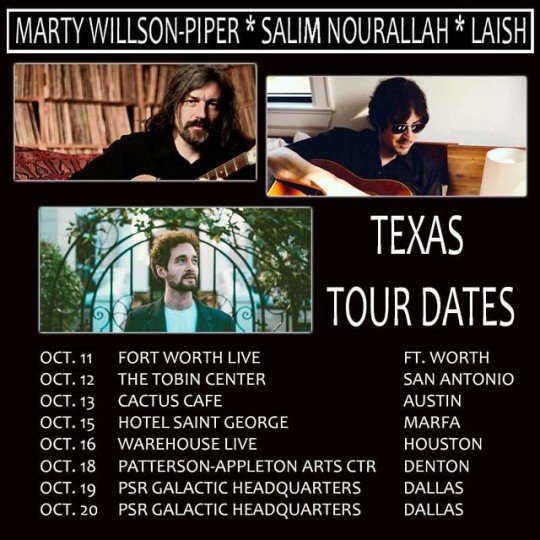
We proceeded to attend three more: Cactus Cafe in Austin and the two shows at the Palo Santo Galactic Headquarters - words that held zero meaning to me until I actually went there: it’s a space Salim set up next to his recording studio in Dallas. The space accommodates about 30 and is the perfect location for comfortable, intimate shows. Palo Santo is the independent record label founded by Salim and the similarly incomparable Sarah Henry.

During this run of shows, I got to talk to Salim both in person and on Facebook. I learned that he was not an “opener” for Marty Willson-Piper, he was the mastermind that made the whole tour happen. I signed up for his mailing list and even if the name is tongue in cheek - The Cult of Nourallah - it’s spot on. Salim is the most charismatic person you will ever meet. If he thinks you should listen to a certain artist or album, it will appear on your chosen music player. If he really did want to start a cult, you’d go buy whatever color shoes he instructed. And he does it all with a calm, quiet, reassuring presence that lets the music speak for itself.
After these shows, I started listening to Salim’s albums. All of them. A lot.
No really… a LOT.
His style is simple, clean and straight forward. The songs are heartfelt and often autobiographical. Though coming from a musical background of performance and recording with his brother Faris, Salim’s solo career began in 2004 with the album “Polaroid” and has spanned the next prolific fifteen years to 2018’s “Somewhere South of Sane.”

I quickly assimilated the music from his albums in to my personal first aid kit of songs. I recently helped a friend through a painful divorce and played Salim’s “It’s Ok to Be Sad” for her. The idea is often something overlooked in adulthood and though it seems simplistic, the act of permission can be profound. It’s ok to be sad. It’s ok to mourn. Things don’t work out.
I ended up giving that friend Salim’s entire “Somewhere South of Sane” vinyl set. SSOS is an album that I digested in pieces myself . The songs feel so personal - the songwriter’s own heartbreak on public display - the act of musical consumption feels like voyeurism. Spying through a window at people hurting each other. It reminded me so much of my own first marriage - at a much too early age - and divorce that it was difficult to hear. I felt well armed in that moment and profoundly grateful that Salim gave me something that I was able to pass on in the name of healing through the acceptance of grief.
While I put my arms around my friend at the local courthouse and held her through the end of her marriage, I struggled in my own personal life with a health scare that could possibly change everything. I held on to Salim’s “Don’t Be Afraid” at this time and probably listened to it twenty times. I’ll try not to be afraid. I’ll try. I’ll try to be brave… still, Salim, keep telling me. It’s nice to hear. Ultimately, after an agonizing length of time (agony and length only felt by the person in it), I learned I was ok. Here I appreciate Salim’s “Goddamn Life” (Hit Parade, 2012.) I’m so in love with my goddamn life. It may be scary and it may hurt at times, but look at the alternative… right?
There’s a certain degree of uncertainty in being a member of the human race. We all secretly think we are doing it differently and most probably wrong. We toil next to each other in silence and the great tragedy is: we’re all doing it pretty much the same, but we don’t know that. To be unsure of this, but to put it in song anyway and then present for the world to hear takes bravery I cannot even comprehend. Trying to describe love is like trying to describe the color blue. You put your song out there with the secret fear: what if that’s not love? What if that’s not blue? What if I’m doing it wrong? What if everyone else sees things differently? What if there’s something wrong with me?
* * *
Fast forward to last weekend - Saturday May the 4th. I had the honor of gathering with Salim and his friends to celebrate with a retrospective show at Palo Santo.
“If I really had to break it down,” Salim told us when announcing the event, “the one that thing that has meant the most to me is writing songs. So it seemed fitting to spend my upcoming birthday not only with my real family but also with my ‘other’ family: my family of songs. I'm sure you've probably heard songwriters refer to their songs being almost like children. It's a hard thing to describe…”
But he does describe it in “Stranger in My Own Skin” (Constellation, 2009), “I’m gonna take some pain and stick it to a tune so you can sing along, get the words all wrong.” And he did. He stuck pain to a lot of tunes. Pain, laughter, love, heart break, friendship, desire, despair, betrayal... He stuck feelings to 15 years worth of tunes and more and on Saturday he indulged us in tastes from each album to commemorate another year of his existence on this planet.
The vibe was laid back and friendly - Palo Santo is like no other place you will ever experience. It’s more like going over to Salim’s house, his face lights up and he says “Here, let me play something for you…”
The configuration was different this time than others I had been in attendance there. Chairs were arranged on three sides, a seat and a guitar against the wall in the middle. When Salim took his place in front of us, the small crowd immediately fell silent - not like fearing the wrath of a teacher chiding students for talking, but more like the anticipation of watching a magician about to perform a magic trick.
And there was a magic trick of a sort: projected on the wall above Salim’s head was suddenly the album cover of “Polaroid.” Salim chatted about this cover and each subsequent one as he told stories about each and sang the songs he chose to represent that album and period in his life. We were instructed to sing along and we did so - almost reverently - with Salim’s guidance.
Set one covered: Polaroid, Beautiful Noise, Snowing in My Heart, Constellation and Hit Parade (2004-2012). We then took a break to share a fabulous cake, chat and sing Salim “Happy Birthday.”
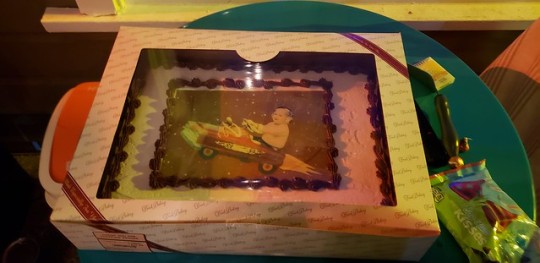
Set two then covered: Friends for Life, Skeleton Closet, The Travoltas, NHD (Salim’s project with Billy Harvey and Alex Dezen) album And the Devil Went up to Portland, and finally Somewhere South of Sane (2012-2018).
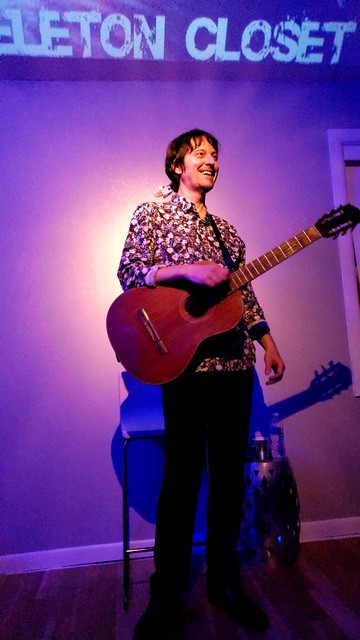
Though Salim got to what was supposed to be the final song from SSOS, “Rainbow Dolphins” was then brought up by an audience member. Salim just grinned and assured us he could play that too. And he did.

I didn’t want the evening to end. We all filed out of Palo Santo in to an absolutely beautiful, cool Dallas night. We chatted with each other and eventually goodbyes were said and people began to wander away. I yawned one too many times and may or may not have enjoyed just a touch too much wine. My husband, Doug, eventually took my hand, we thanked Salim and drifted away ourselves.
The magic doesn’t have to end quite yet as Salim has put up part two of the birthday retrospective for sale next weekend (a few tickets remain and can be acquired here: https://www.prekindle.com/event/26257-birthday-retrospective-salim-nourallah-2nd-show-dallas). This was a singularly unique event and though lightning isn't supposed to strike twice, if anyone could make that happen, it is Salim. Next weekend will be just as magical.
Links of interest:
https://www.instagram.com/palosantorecords/
https://www.instagram.com/salimnourallah/
http://salimnourallah.com/
https://palosantotx.com/
https://www.facebook.com/salimnourallah/
https://www.facebook.com/palosantotx/
#salimnourallah#alexdezen#billyharvey#nhd#polaroid#beautifulnoise#snowinginmyheart#constellation#hitparade#friendsforlife#skeletoncloset#thetravoltas#andthedevilwentuptoportland#somewheresouthofsane#dallastx#palosantorecords#independantartist#independentmusic#supportmusic#supportart#sarahhenry#dannygreen#laish#thechurch#martywillsonpiper
0 notes
Text
Paradise Lost
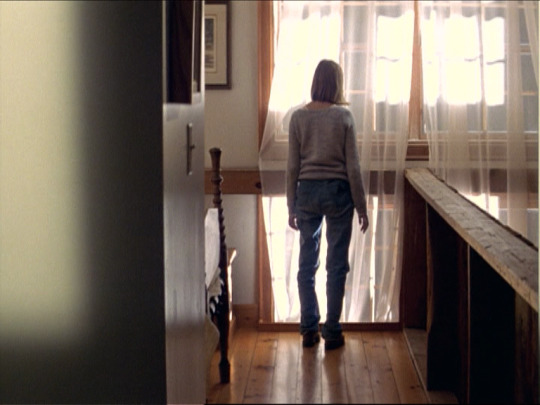
The sign of a bad film is that it reduces to the text, be it screenplay or a piece of written fiction as source material. The sign of a good film is conversely its irreducibility to the text. Rather than just showing what happens or telling a tale, it is sometimes more appropriate to depict what happens or to depict a tale. For it is depiction, both visual and auditory, which is the primal means of cinema, whereas writing is of literature, song is of opera, rhyme is of poetry, and molding is of sculpture. The depiction of something can, however, as it often does in the case of cinema, manifest traces of all these means. In its depiction of a tale or merely the way things are, cinema can use words in dialogue or narration, cinema can use song and music in score or construction of milieu, and, above all, cinema can sculpt. Not only does one say in Tarkovskyan terms that cinema is sculpting in time but also that it sculpts time in the process. “Time is the material,” says Atom Egoyan [1] whose magnum opus, the eerie, enigmatic, and utterly unforgettable The Sweet Hereafter (1997) is celebrating its 20th anniversary this May since it competed for the prestigious Palme d’Or at the 1997 Cannes Film Festival.
Embracing the idea of time as the most vital material of cinema, Egoyan does not, of course, limit himself to the notion of cinematic sculpture. His most critically acclaimed film is also based on a novel, which it seems to have surpassed in more than one way (judging from a handful of reviews [2] since I have not read the Russell Banks novel of the same name myself), it makes use of both popular and folk music to a large extent, and it takes an allegorical framework from the poem The Pied Piper of Hamelin. But no one in their right mind could accuse writer-director Atom Egoyan for theft, borrowing, or lack of originality because it is precisely the blending of different means which makes The Sweet Hereafter the best film Egoyan has ever made. It is this unique combination which allows him to do what he does best: study the human experience of loss, desire, and obsession by sculpting in time and space, both of which are the primary characteristics of human experience.
The depicted tale in The Sweet Hereafter is undeniably special but it is anything but complex. It is a story about a small Canadian town where most of the children have been lost in a tragic school bus accident whose sole survivors are the childless school bus driver Dolores and Nicole, an adolescent crippled by the crash, a girl who dreams of becoming a rock star while her father, her musical benefactor, has also become her incestuous lover. Arriving to the town is a lawyer, played by Ian Holm, carrying his own burden of loss, who wishes to file a class action lawsuit with the townspeople against the bus company or anyone looking like a potential embodiment of guilt. The lawyer manages to rally up the townspeople, but during the last day of hearing for the lawsuit, Nicole surprises both the lawyer and her father by concocting a lie that destroys all possibilities for such a lawsuit: she claims that Dolores was driving too fast.
Had someone told me this story beforehand, I might have been, at best, slightly curious but would have expected nothing more than a visual book about people crying and overcoming grief. Fortunately, I had no prior knowledge of the film when I sat in front of the film screen three years ago and witnessed The Sweet Hereafter unfold in a screening at my local cinématheque. The important thing to notice is that the film was not what I expected because, to my mind, it is precisely the unexpected which characterizes the film throughout. Based on the above synopsis, one might expect a linear story where one first sees the townspeople before the accident, then sees the accident, and finally sees its aftermath. One might also expect a film utilizing a flashback structure, showing first the aftermath and then the accident as well as the events prior to it. One might even expect a quasi-Antonionian film where the accident would be shown at the very beginning after which the film delved into its post-impact on the community rather than studying the events before it. None of these expectations are true of Egoyan’s film, however. Having its kindred spirits in the great modernists, Egoyan’s The Sweet Hereafter breaks up Banks’ linear story structure and presents all the temporal levels simultaneously, tightly tied together, in an insightful fashion blending simultaneity and succession.
Egoyan had already mastered this kind of narration in his earlier film Exotica (1994), whose commercial success, new to Egoyan back in the day, enabled him to make his dream project, but a deeper raison d’être is found for it in The Sweet Hereafter. The reasons for the functionality of such narration in The Sweet Hereafter are quite simple. While Egoyan has always had an eye for an all-encompassing narration that embraces multiple temporal paths at once ever since the very first shots of his debut Next of Kin (1984), never before The Sweet Hereafter did he find a core strong enough to hold the diverging paths together, to cut their wings from flying too far, so to speak. This core is the emotion attached to the central event in the film’s story world (the school bus accident), but specific attention should be placed on the choice of words here: it is not the event itself that is the unifying core of the film but the emotion attached to the event; and it is this emotion that is articulated by Egoyan’s use of cinematic means.
Style as an Articulation of Loss
The emotion which Egoyan’s cinematic style articulates is, first and foremost, the emotion of loss. There is a lot to be said about all of the cinematic means utilized by Egoyan, but the best way to grasp Egoyan’s style in The Sweet Hereafter as a whole is perhaps the attempt to characterize them in general terms. From cinematography and editing to mise-en-scène and music, Egoyan’s cinematic style creates a serene aesthetics of tranquility which both exemplifies and expresses the human experience of loss.
Above all, perhaps, the strikingly beautiful cinematography enhances a serenity and an enchantingly calm mood in The Sweet Hereafter. The camera moves slowly and the shots are, at times, strikingly long in duration. A long take, shot with a slowly tracking camera, starts the film as we see a wooden surface which turns out to be the floor of a summer cottage where a family of three is enjoying the bliss of their mutual existence. This is followed by another long take inside a car going through a car wash. In a later scene, there is a sequence shot introducing the character of Allison who sits next to the lawyer on a plane two years after the failed lawsuit. In a peculiar point of view shot, the camera tracks down the body of Dolores’ handicapped husband as the lawyer’s eye lingers on the man’s perished bodily existence. During the hearing of Dolores, the camera tracks slowly around the large table, reaching its target of Dolores in long medium shot. A similarly slow tracking shot recurs when Nicole is being heard: the camera slowly embraces all the characters one by one in the space and then goes by each one once more before switching to a calmly accelerating montage at the point when Nicole concocts the climactic lie, a pause to a dance, a denial of riches from those who do not believe in accidents.
In terms of camera movement in The Sweet Hereafter, the recurring upward movement of the camera turns into a visual motif. As the children arrive at the fair in a scene whose temporal distance to the accident remains unclear, the camera tilts up to a Ferris wheel. As the bus is curling in the narrow roads of the snowy landscape, the camera tracks to the sky in a beautiful aerial shot working as a shift to the airplane in a later temporal level where the lawyer and Allison are discussing. As Dolores breaks down after talking with the lawyer, the camera slowly tilts up to reveal a wall filled with the pictures of the deceased children above her solitude. As the lawyer’s wife lifts up Zoe, their daughter, in a field, the camera tilts up toward the sky. As Nicole shares a moment of incestuous romance with her father in a candlelit barn, the camera moves steadily upward in an eerie crane shot. In all of these examples, movement is a form of visual poetry. It is a line of temporal sculpture. It articulates something beyond words. It might bring depth or myth to the scenes but also challenge the characters in their self-constructed spaces of strange safety. In this sense, movement can articulate loss: it is as if the camera took departure from something that could no longer be retained, leaving those lost moments in their elusive distance. In the third example of the camera tilting to the pictures of the children on Dolores’ wall, this thematic dimension is emphasized by a striking use of rack focus as the pictures escape from the camera’s field of focus into an unknown realm beyond our reach.
If camera movement and optics are used to articulate the theme of loss in emphasizing the temporal distance between the different temporal levels, then juxtaposition of different shot scales is used to highlight spatial distance between different spatial locations. One of the first visual memories a spectator might recall from The Sweet Hereafter is its relentless use of breathtaking aerial shots of the school bus driving in the snowy landscape as if on a pre-determined path to destruction. Such large shot scales characterize the film throughout from the long shot of the lawyer walking from the house of one of the parents to his car to the long shot of Nicole leaving from Billy’s place to her father’s car about to take her to their secret place of incestuous love. Despite Egoyan’s emphasis on the distance between the camera and the character in these large shot scales, there are also some cases of intimacy between the camera and the character in extreme close-ups. There are two such cases and both feature close-ups of the mouth. One of these is a close-up of the mouth of Nicole’s father after he has witnessed his daughter concocting the lie, but for reasons of length emphasis shall be put on the other case.
It concerns one of the many phone calls the lawyer exchanges with his drug-addict daughter who is always calling for money from her father. The scene begins with a long shot of the lawyer standing by the damaged school bus after an intense confrontation with Billy, a parent who lost both his children in the accident after losing his wife some years before the accident. As the lawyer answers his phone, there is a cut to a long shot of the lawyer’s daughter, Zoe standing in a phone booth in the middle of multiple highways in an unnamed city. This is followed by a medium close-up of the lawyer from which there is a cut to a full shot of Zoe in the phone booth. Another medium close-up of the lawyer and then a long medium shot of Zoe. Yet another medium close-up of the lawyer and then a surprising cut to a close-up of Zoe as a baby in a point of view shot from the lawyer’s perspective in another temporal level. Then a return to the medium close-up of the lawyer. The scene concludes with two shots: first an extreme close-up of Zoe’s eyes but then the camera tilts slowly to her mouth, second an extreme close-up of the lawyer’s mouth but then the camera tilts slowly to his eyes.
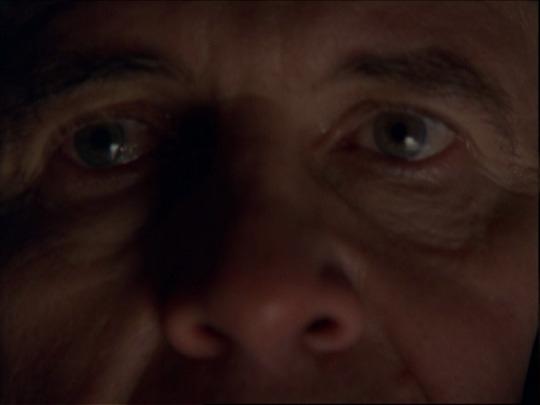
There are many things to notice about Egoyan’s stylistic choices in this scene. The surprising cut to the flashback, which has been explained in an earlier scene where the lawyer told Allison how Zoe once came close to death when bitten by a spider as a child, occurs as Zoe gets angry, complaining how her father never believes her. The cut signifies distance between father and daughter. In an earlier scene, the lawyer told Billy about his daughter, saying that “something terrible has taken our children away,” referring to both the accident and his daughter’s condition. During this phone call, it is as if he escaped to the past, perhaps in part hoping for his daughter’s premature death so she could be better encapsulated in the unreal innocence of childhood, a perverse pleasure he might believe the town’s parents enjoy. Another thing to notice is the use of the same medium close-up of the lawyer throughout, while there is a continuous, analytical development of shot scales from larger to smaller in Zoe’s case. This is typical because the environment she is in has to be established for the spectator, but it also enhances the distance between the two characters. The final thing to notice is the juxtaposition of the two last extreme close-ups which are set against the two establishing long shots at the beginning of the scene. The camera movement in these shots is reverse: first downward and then upward. It further enhances the intimacy, on the one hand, and the distance, on the other, between the characters. During the moving extreme close-up of Zoe’s face she tells her father that she can hear him breathing to which her father responds that he can hear her breathing as well. As Zoe starts breaking down and says that she is afraid, there is a cut to the mobile extreme close-up of the lawyer’s face. While the camera lingers on his mouth, he says: “I love you Zoe.” As the camera starts tilting upward, he continues: “I’ll soon be there. I’ll take care of you, Zoe. No matter what happens, I’ll take care of you.” The poignancy of these lines lies in the fact that they are left echoing in the void since they receive no response from Zoe. What is more, she is never seen again in the film, but the latest temporal level in the film, that is, the flight two years after the accident, ensures us that nothing has changed since the lawyer is travelling to another clinic to see his daughter. Their distance remains insurmountable despite access to such technological achievements as telephones and airplanes.
By visually treating the themes of distance and intimacy in such a complex fashion, Egoyan is able to articulate loss by cinematic means. The lawyer has lost the connection to his daughter and can only have these ironic instances of connection through the airplane and the telephone which is a paradoxical device that both connects and separates people. This paradoxical nature is also captured in the use of shot scales and camera movement in the scene analyzed above. The characters are very far away from each other both spatially and emotionally which is enhanced by the different shot scales used to depict them in their respective spaces. The two final shots ironically both bring them together since the shots are in the same scale and pull them apart since the camera movement is reverse: the upward movement from the lawyer’s mouth to his petrified gaze as he mechanically delivers the lines to Zoe’s corresponding silence emphasizes their unresolved distance.
Given that Egoyan’s bravura is the aesthetic combination of different means, it is no surprise that his stylistic program in his magnum opus does not stop at the brilliant use of the camera. In fact, The Sweet Hereafter could be appreciated merely for its beautiful, lyrical mise-en-scène. Egoyan constructs spaces which vary from warm indoor spaces to cold outdoor spaces of gorgeous mountain landscapes in winter. The most striking visual conflict is experienced between the two temporal levels farthest from one another in chronological order: the sterile space of the airplane and the ethereal warmth of the summer cottage in the lawyer’s flashback, partly in the real past, partly in a fantasy of the past. Egoyan’s mellow, full-bodied mise-en-scène is characterized by strong yet pale colors with the color blue as peculiarly dominating from the bluish car wash and the club lights next to the phone booth from where Zoe first calls her father to the snow in the winter dusk, Nicole’s clothes and the curtains, the blanket, and the door in her new room after the crash.
Egoyan’s use of color, light, and space further articulate the theme of loss. The dominating color blue, characteristic of the entire atmosphere of the film, is the color of coldness and innocence, it is the color of melancholy, it is the nostalgic and romantic color of sweetness that is challenged, for one, by the bright redness of the blanket Nicole wraps herself into before sharing an intimate moment with her father in the candlelit barn. When the lawyer first arrives to town, he meets a couple who own the town motel in order to inquire who he should try to rally up for the lawsuit. In other words, he needs help to separate “the good people” from “the bad people”. The husband’s chips-munching behavior in the scene already underlines his arrogance and self-indulgence while he is trying to critique others for their actions. Egoyan yet further emphasizes the irony of such an attempt at separation by having the lawyer move to a different space to answer his drug-addicted daughter’s phone call while the motel-owning couple is left to argue on a deeper plane who of the townspeople are “the bad people”. In terms of lighting, Egoyan’s style is most apparent in the unforgettable ending of the film where a quick flash of bright light emerges before Nicole standing by a window. The peculiar thing about this device is not only its self-awareness, almost turning the spectator away from the diegetic world, but the fact that the scene takes place before the accident. Yet this succession is only diegetic; in the poetic space Egoyan has created, there is no such succession. Thus the flash of light appears as a cut, a cut to the sweetness that Nicole, among others, is about to lose.
In addition to more elusive elements of light and color, an integral role in Egoyan’s mise-en-scène is played, of course, by the school bus. The school bus is first seen in the film when the lawyer exits his car in the car wash as he seems to be stuck. When he exits the car wash, he ends up in Billy’s apartment from whose window he can see the damaged school bus by the road. Accompanied by eerie screams of the children from an off-screen space, and obviously from a diegetically earlier temporal level, the school bus becomes a symbol for a paradise lost, for the loss of sweetness in a fragile world created by its fragile inhabitants whose world can be cut open by a flash of bright light.
Besides cinematography and mise-en-scène, Egoyan’s masterpiece of blending material is unforgettable precisely due to its breathtaking use of music composed by Mychael Danna who is also responsible for the alluring music of Exotica. Danna’s music is simultaneously flamboyant and utterly tender, a seeming paradox that is born from the juxtaposition of the lighter sound of the flute and the heavier sounds of the other instruments. The music is thematic, since it is associated with The Pied Piper of Hamelin read by Nicole, but above all alienating. When Egoyan uses the music with the shots depicting the last journey of the school bus, the music does not work as a paraphrase (in the sense that it would accompany the diegetic events) nor does it really identify the spectator with the depicted events. On the contrary, Danna’s music seems to alienate the spectator, working as a higher level of discourse as if mythologizing the diegetic event of the accident. It brings the event forth, it puts it on an unreal pedestal of cosmic tragedy which shakes the core foundations of the townspeople’s fragile universe. It is important to notice that while Danna’s music does not accompany neither does it counterpoint. While music that sounds Eastern seems quite unfit for an ordinary Canadian town in the middle of nowhere, it does not feel to create a striking counterpoint to the diegetic events either (in the sense that it would be joyful while the events were sorrowful, for instance). The music shares something in mood to the diegetic events. They share a metaphysical bond. In this sense, Danna’s music used by Egoyan could be characterized as creating a parallel dimension, a parallel level of discourse which attains commentary contact with the diegetic world without fully fitting into it or fully opposing it either.
In addition to Danna’s Armenian flute music, Egoyan also uses popular music mainly sung by Canadian singer/actress Sarah Polley who plays the role of Nicole. This music is both diegetic, in the sense that Nicole really sings in the story world (at the fair in the beginning, for one), and non-diegetic, in the sense that the songs do not always directly belong to the story world. In general, however, it seems best to say that the use of the music in The Sweet Hereafter cannot be entirely appreciated by these kinds of categories. For example, when the song “Courage” is heard sung by Polley as Nicole’s father is taking his daughter to the hearing, there is no one in the story world singing the song, but at the same time it is as if Nicole -- or some higher level of discourse connecting to her -- was expressing her emotions. This becomes even more convincing when considering the fact that Nicole has just pointed out to her father how she is “a wheelchair girl now” and how it is “hard to pretend that” she is “a beautiful rock star,” a poignant reminder of the father’s guilt for his abuse of his daughter. Although the songs sung by Polley do not feel as contradictory to the milieu of the story world as Danna’s Armenian flute music, they too seem not to accompany or to counterpoint the diegetic events. Rather they too create a parallel, commentary dimension to the events witnessed by the camera as if enriching the experience. They serve as a reminder of something being lost, the lack of a primordial sense of connection.
As such, Egoyan’s style in The Sweet Hereafter articulates and expresses the human experience of loss by cinematic means. From the distance and movement of the camera as well as the juxtaposition of different shot scales and choices in editing to use of light, color, and music, Egoyan depicts a tale of loss, how the spatio-temporal human experience always entails a loss of something. At the beginning of this section it was mentioned that not only does Egoyan’s style express but also exemplify the experience of loss. This has become evident through the above analysis of the style of the film. Egoyan’s style bears a similar fragmentary quality and a sense of disconnection as his narration. The large shot scales and the complex compositions utilizing depth and many planes simultaneously coerce the spectator into experiencing loss: one must choose the objects of one’s visual and auditory attention in the process of which one loses something. As a result, according to Vivian M. May and Beth A. Ferri, the spectator becomes aware of the process of meaning making since meanings are not passive, enclosed and stable but, on the contrary, active and transient [3]. In this sense, already on the level of style in the sense of consistent use of cinematic means, Egoyan’s film exemplifies the experience of loss which is further elaborated by the fragmentary structure of his narration.
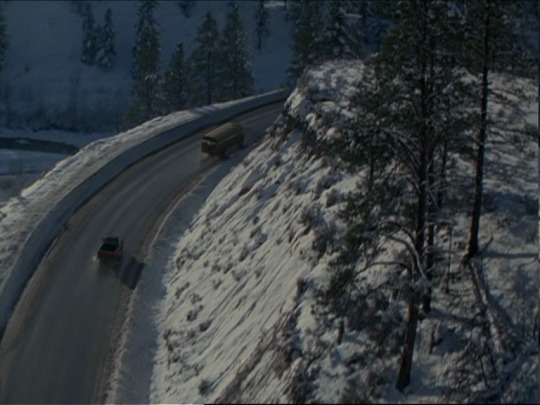
Fragmented Narration as a Shattered Mirror of Loss
As said above, it is the unexpected that characterizes Egoyan’s The Sweet Hereafter. If Danna’s music is at the very least surprising in the context of this particular story and the beginning shot of a wooden surface developing into a breathtaking sight of a dormant family on the floor of their summer cottage manages to catch the spectator off guard, so to speak, Egoyan’s narration as a whole in the film is even more challenging. Since it is challenging, it also draws the spectator’s attention to itself and as such becomes self-aware instead of being transparent in the classical sense of cinematic narration. I would argue, once again, that one remembers the film precisely for the way its story is told rather than the story itself: while one might certainly recall the school bus accident, the several interconnected stories fade in memory at the expense of the unique mode of narration. Like Egoyan’s cinematic means, so does his narration both express and exemplify the experience of loss.
It is time, as one of the two primal features of human experience, which is the material to Egoyan’s cinema, and narration, of course, is a temporal process of narrating something. Despite the fragmentary structure of narration in The Sweet Hereafter, its use of different temporal levels can be analyzed in distinct parts quite easily. In chronological order, there are five temporal levels. First, there is the summer when the lawyer’s daughter Zoe was bitten by a spider and her father had to rush her to the hospital, being constantly on the verge of cutting her throat open in case it would swell up. This includes the first shot in the film, the flashback shots when the lawyer tells of the incident to Allison as well as the cuts to these shots in some other scenes with the lawyer (as in the scene analyzed above with the lawyer’s last phone call with Zoe). Second, there is the time before the accident which contains the scenes at the fair, the night before the accident when Nicole reads The Pied Piper of Hamelin to Billy’s kids while Billy visits her secret lover at the motel after which Nicole is taken to the candlelit barn by her father. Third, there is the day of the accident (sometime in 1995). This contains the accident, the brief scene with Billy experiencing its aftermath as his children among others are put in body bags, and the final voyage of the school bus leading to the accident. Fourth, there is the time after the accident. This includes the scenes where the lawyer interviews the townspeople trying to rally them up for the lawsuit, the scenes with Nicole in the wheelchair at home and during the hearing. Fifth, there is the time two years after the accident (identified as the year 1997). This includes the scenes at the airplane where the lawyer talks with Allison, Zoe’s childhood friend, as well as the scene at the airport where the lawyer encounters Dolores, now working as the bus driver at the airport.
Relations between events within these distinguishable temporal levels may be themselves complex, but even more so with regards to the relations between the temporal levels. In a fashion reminiscent of avant-garde narration or lack of any narration, The Sweet Hereafter begins with an ambiguous blending of three different levels: first there is a shot of the lawyer’s family in their summer cottage (the first level), then there is a shot of the lawyer in the car wash having a telephone call with his daughter (the fourth level), and then a scene at the fair where Nicole is practicing with her band (the second level). The first time spectator has no idea what is going on and what the connections between these levels are. While the first scene can be dismissed as a vague event somewhere in the past, a background image for the opening credits, the scene at the fair remains of sheer ambiguity with regards to its temporal relation to the other diegetic events on the second level as well as to the other levels.
It is this ambiguity that lies at the core of Egoyan’s complex narration which operates essentially with the unexpected. For this peculiar opening is anything but exceptional in the whole of the film. Narration does have diegetic information regarding the events of the story world, but it communicates this information quite slowly to the spectator. Many informative gaps are left with regards to the temporal relations but also the content of the shots: the incestuous relationship between Nicole and her father is merely hinted at with one scene without any dialogue. It is this ambiguity which both expresses and exemplifies the experience of loss: the loss of an epistemic connection coincides with the loss of an existential connection.
A similar ambiguity can be noticed when trying to categorize the kind of narration in The Sweet Hereafter. First, one might try to categorize focalization in the film. While the film has no single narrator, Nicole does seem to gain an important position as her voice prevails on the soundtrack as voice-over. This begins with her reading The Pied Piper of Hamelin to Billy’s children, but towards the end especially her voice takes a stronger position as an intra-diegetic narrator when, as the lawyer sees Dolores at the airport, she says:
As you see her, two years later, I wonder if you realize something. I wonder if you understand that all of us - Dolores, me, the children who survived, the children who didn't - that we're all citizens of a different town now. A place with its own special rules and its own special laws. A town of people living in the sweet hereafter.
The way how Nicole articulates feelings of loss in this phrase deserves its own essay, but here it suffices to notice that she gains a higher place with regards to narration than any other character. Taking into consideration that she also represents a challenge to the lawyer and her father, who have sometimes been interpreted as an embodiment of a simpler, classical cause-and-effect narrative [4], this narrative device once again expresses and exemplifies the experience of loss; it is the loss of control over events. The lawyer proclaims that “there is no such thing as an accident” and believes that “something terrible has happened that has taken our children away from us,” but in contrast to Nicole’s melancholic acceptance of “the sweet hereafter”, the lawyer’s beliefs fall flat and merely represent an attempt to escape loss. The lawyer, Nicole’s father, and most of the townspeople try to find a reason for the accident, which coincides with an unconscious pursuit for a raison d’être for their existence, but Nicole denies them of this possibility in a similar manner as Egoyan’s narration denies the audience of a clear, classically structured plot, a stable meaning as an illusory reflection of the audience’s meaningful life. Instead, the audience is forced to stare at a shattered mirror, a poignant picture of their meaningless existence.
In addition to focalization, or the kinship between narration and the character of Nicole, one could, secondly, try to categorize Egoyan’s narration with the notions of diegetic and mimetic narration. Mainly used in literature theory, the two notions distinguish narration that merely shows what happens without drawing much attention to the act of showing (mimetic narration) and narration that tells what happens, making it more or less explicit that it is being told to someone by someone (diegetic narration). Cinema is the epitome of mimetic narration since it usually shows us things rather than tells them. This is not very true of The Sweet Hereafter, however. Narration lingers on not showing the central event of the story world, that is, the school bus accident, many things are left open, and, above all, the whole film draws attention to its narrative structure due to its peculiarity: it is as if someone was telling this tale to us, though it remains unclear who this someone is; the reason for this ambiguity is that someone is not telling us a tale but depicting it. It is noteworthy that this attention to structure does not draw the spectator away from the story world or hinder the spectator’s potential interest for the characters; Egoyan himself has noticed how he finally discovered an emotional core strong enough not to drive the spectator away from his non-linearly structured films [5].
It is generally thought in literature theory that the so-called free indirect discourse situates itself between diegetic and mimetic narration, which is the case in The Sweet Hereafter as well. While its narration could be characterized as diegetic, it also uses free indirect discourse especially in the quick cut to Zoe’s face in the first temporal level in the scene analyzed above where the lawyer has his last phone call with Zoe as well as in the scene where Billy experiences the horror of the school bus accident, witnessing a paradise sinking down to the bottom of an icy lake. Towards the end of this scene, there is a low-angle shot of Billy which is followed by a cut to a close-up of a body bag. The important thing to notice is that Billy is quite far from the scene of the accident. He is on the hill, whereas the body bags are located closer to the icy lake. It is as if the cut focalized into Billy’s perspective without really focalizing into it. This peculiar form of narration is known as free indirect discourse: saying, thinking, or narrating something through someone without embracing their perspective completely. It is even more striking that this scene is followed by a confusing cut to the shot of the lawyer’s family (which the first time spectator does not yet know to be the lawyer’s family) at their summer cottage before the lawyer goes on to tell about the incident to Allison. The juxtaposition of these two tragedies at the center of the film emphasizes the experience of loss. They remain unclear tragedies without clear focalization, as though escaping beyond our reach.
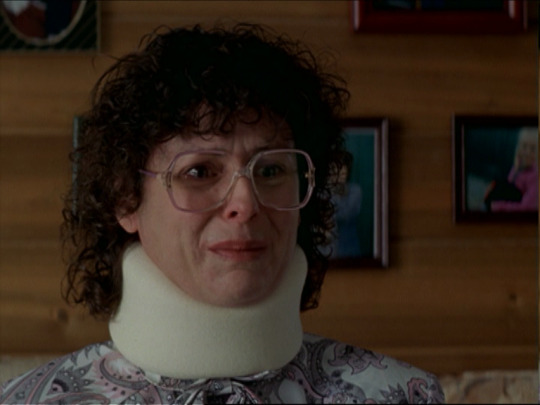
Another essential example of free indirect discourse in Egoyan’s narration in The Sweet Hereafter is the scene where the lawyer is interviewing Dolores, the school bus driver. As Dolores begins to tell about the day of the accident to the lawyer, there is a shift from the fourth level to the third level. At first glance, it might feel as if narration focalized into Dolores’ perspective since she is talking about the event, but the aerial shots as well as the scene with Billy analyzed above challenge this interpretation. The “flashback”, if it can even be called that, is motivated objectively, and narration in these scenes is better grasped as free indirect discourse. The Sweet Hereafter has an ambiguous narration to it which alternates between different perspectives as well as the lack of intra-diegetic perspectives in a fashion which both expresses and exemplifies the experience of loss: narration mythologizes the central event of the accident and creates both distance and intimacy to it.
A narrative device of paramount importance and worthy of specific attention in The Sweet Hereafter is, of course, the use of the Robert Browning poem The Pied Piper of Hamelin. As off-screen voice-over narration, the poem is first heard in the scene where Nicole’s father takes her to the candlelit barn. Nicole reads the part “one was lame / and could not dance the whole of the way” of the poem and repeats it in the beginning of the scene of the hearing towards the end of the film. The notion of “being lame” is associated not only with Nicole’s physical handicap due to the accident but also with her mental suffering due to incest. Thus her frustration for not being able to “dance the whole of the way” with others -- the townspeople with the lawsuit, on the one hand, and the children to death, on the other -- expresses loss. At the end of the latter scene, Nicole’s reading surpasses the poem and its lyrical form merges with her personal account of the events in voice-over: “As you see her, two years later...” The poem serves as an allegorical framework in which the lawyer represents the pied piper who summons the townspeople by his side, but it also expresses the experience of loss. It emerges as a mythological explanation for the accident, as an allegory for the “something terrible” that has taken the children away from the townspeople. Steven Dillon writes aptly that it
serves as a kind of myth or anti-myth for why all the children are away, for ‘why’ the children have been killed in the bus crash. As the children vanish into the sweet hereafter, the overheard poem serves as a kind of relentlessly unsatisfactory aesthetic explanation. Nicole uses the poem to read to sleep two children who will be killed; she holds the book over legs that will soon be crippled. The rhymes of the poem are clever, even soothing; the lines of the poem are strangely appropriate to the visual context; but the suffering is not diminished, not at all. The poetry takes us into impossible worlds, but worlds which do not help us escape. This lyricism is neither idyllic nor utopian. [6]
A narrative theme, so to speak, which comes up again and again when discussing narration in The Sweet Hereafter is, of course, time. There are different temporal levels in the film, the way how narration occurs in time influences the way one categorizes it, and the temporal relations between the different narrative elements play their part in the process of making meaning. In most of Egoyan’s films, specific emphasis is placed on the way how temporality constitutes subjectivity of character and how this constitution emerges temporally. In Exotica, an enigmatic web of different temporal levels creates a slowly unfolding revelation of the protagonist’s wounded subjectivity; in Family Viewing (1987), a man tries to re-constitute himself by erasing filmed footage of his past and replacing it with homemade pornography; in the beginning of Next of Kin, two parallel temporal levels compensate one another in articulating the protagonist’s loss of identity and his change of identity. In kindred spirit to Marcel Proust, Egoyan does not in The Sweet Hereafter try to do this either by taking a long period of time and several events or by portraying temporal chain of events in a linear, chronological fashion. By excluding these options, Egoyan embraces an aesthetic strategy, in philosophical proximity to Proust and other modernists, in which he takes individual moments that in connection to others slowly uncover the characters’ subjectivity; these individual moments are joined together -- their wings are cut in order to prevent them flying too far away -- by the emotion of loss attached to the central event, a temporal nexus for the scattered temporal levels. What is more, Egoyan’s reliance on non-linear and fragmentary narration emphasizes the lived dimension of time as the past, the present, and the future merge together as if in an existential epiphany where simultaneity and succession were blended as one.
Given the more or less formal approach of Egoyan’s cinema, specific attention should be placed on the rhythm of his narration. Dillon quite aptly notices that The Sweet Hereafter is more poetic than prose-like, despite having its source material in the latter [7]. This is not a mere analogy, which might find its inspiration from Egoyan’s insightful use of The Pied Piper of Hamelin, which is not featured in Banks’ novel, but a profound observation of the depth of Egoyan’s work. The Sweet Hereafter is a poetic film because its narration operates on the basis of images and associations rather than the laws of cause and effect. The shot with the lawyer looking at the damaged school bus as off-screen screams of the children are heard is followed by a cut to the scene where the children arrive at the fair some time before the accident. In this particular transition, it is not really the lawyer performing the association, as noted above in characterizing Egoyan’s narration as free indirect discourse, but narration performs the association partially through him. There is a serenely flowing rhythm at work in the film, a rhythm which ties different temporal levels together on the basis of the human experience of loss. This is evident also towards the end of the film where a fluent montage sequence covers a wide range of events and temporal levels: as Nicole’s voice-over is heard on the soundtrack, first the lawyer sees Dolores at the airport, which is then followed by a cut to another scene where Billy walks away from the damaged school bus which is now being carried away after the failed lawsuit, and then a cut takes us to the fair as the camera tilts from the Ferris wheel to Nicole in blue as she is looking up, which is followed by a cut to a shot of the outer side of another amusement park ride, and, finally, the sequence concludes with Nicole’s voice-over reaching its end as we see her closing the book and walking away from the children’s beds to a window where a brief flash of light emerges before her, possibly from the headlights of her father’s car.
This montage sequence is a pivotal moment for a film, a beautiful sealing conclusion, but, above all, an exemplification of the film’s rhythm. While Nicole’s voice-over talks about the townspeople now “living in the sweet hereafter” where everything is “strange and new,” the images seen do not belong solely to the third and fourth temporal levels, that is, the levels after the school bus accident. Egoyan’s relentless tendency to merge the levels together lies at the core of the film’s rhythm, a rhythm where images do not seem to clearly follow one another but seem to coalesce. If Andrei Tarkovsky is right in claiming that the rhythm of the film always reflects the director’s perception of time [8], then Egoyan’s reflects a phenomenological notion of subjective time-consciousness where the mental processes comprehending the width of presence, in the sense that the present moment contains more than what is immediately and presently given, merge simultaneity and succession into complementary notions. Like Exotica, The Sweet Hereafter ends with a seemingly random moment in the past (though in the latter case its dramatic significance is far clearer) which is, due to Egoyan’s peculiar rhythm and his perception of time, elevated into a moment of epiphany, a moment of the deepest kind of truth, the primordial truth of disclosure which is not experienced in court hearings.
It is also but one example of many instances where narration was as if halted. Since Egoyan’s narration flows as a serene stream of images and associations, narration in the traditional sense (telling a tale in a temporal process) becomes halted and challenged. These moments where narration in the traditional sense becomes halted are analogous to kinds of ellipsis. The surrealist scene where Nicole goes to the candlelit barn with her father lacks any dialogue or any form of narrative explanation since the voice-over reading of The Pied Piper of Hamelin by Nicole in another temporal level seems to have no apparent connection to the diegetic events in the screen space. As such, narration becomes halted. In a similar fashion, the final montage sequence analyzed above lacks narration in the traditional sense, consisting of a rhythm with its own special rules and laws. Another instance is the brilliant cut from the scene of the school bus accident to a slowly spinning high-angle, aerial shot of the lawyer’s family sleeping on the floor of their summer cottage. At first, this cut startles the spectator. It might have a seemingly soothing function as it takes narration away from an emotionally difficult subject matter, while it also alienates the spectator from the story world as narration clearly becomes self-aware at this point (meaning that the spectator pays attention to the editing contrary to the dogmas of classical transparent film narration), but this soothing turns out to be extremely transitory since the cut works as a transition to the scene where the lawyer tells about his own accident in the past where his daughter was about to die. There is only an emotional connection between these two scenes of accident, but since their connection is never articulated by any character, the cut between them remains a moment which halts narration in the traditional sense. Since the film goes along, narrating its way as it was supposed to, this might prove nothing but that Egoyan is not interested in narration in the traditional sense; his films are narrative but on another level.
Like Egoyan’s style in The Sweet Hereafter, so his narration both expresses and exemplifies the human experience of loss. The examples above of narration in the traditional sense becoming halted show how narration exemplifies loss in its loss of diegetic information. In the scene where Nicole concocts the climactic lie, narration is unable to point to any psychological motives in the character delineation of Nicole as to why she lied, though the editing (the cut from a medium close-up of Nicole’s face to an extreme close-up of her father’s mouth) accompanied by the off-screen voice-over reading of The Pied Piper of Hamelin by Nicole might implicitly suggest something. In the cut from the scene of the accident to the slowly spinning aerial shot, there is also a sense of narration losing control; it does not know how to cope with the accident nor does it at the moment provide the spectator with any insight as to why the image is being shown. In the final montage, finally, narration loses information about what happens afterwards and, accompanied by Nicole’s reading, as though spins to a space-time travel of the temporal levels, ending with the scene of the night before the day of the accident.
When it comes to narration exemplifying the experience of loss, several commentators have supported these claims above. To Patricia Gruben, Egoyan’s narration in The Sweet Hereafter by calling images such as the spinning aerial shot “fetishized images” which “are detached from the narrative, interrupting and displacing the dramatic trajectory of the story” [9]. Similarly, May and Ferri highlight how “The Sweet Hereafter is a collective of narratives that intersect and interrupt one another” [10]. According to them, “the film’s multiperspectival narrative structure resists the causal explanation and neat closure that the lawyer, the community, and even the viewing audience might desire.” [11]. Contrasting Egoyan’s film with Banks’ novel, Dillon has also emphasized how the film manages to embrace the theme of the lack of explanation better than the more conventional narrative-wise novel: “although the novel is founded on the crushing lack of explanation surrounding the accident, it might be said that the very form of the novel, in its presentation and manner of telling, refutes its own metaphysical pessimism. The book is its own ferocious lawyer, and creates a world, after all, with no accidents of narrative, but only accidents of event.” [12]. Dillon hits hard to the core by talking about “accidents of narrative” because that is precisely what has been described here: the film’s narration exemplifies the themes of the film and as such embraces them more completely. The lack of explanation prevalent in the diegetic world is also prevalent on the level of narration as it is coerced into finding its epistemic capabilities to be limited because the objects of its epistemic acts are themselves ambiguous.
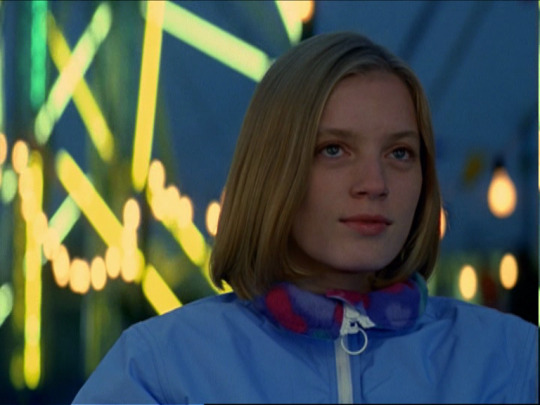
Egoyan’s narration in The Sweet Hereafter is fragmentary and as such expressive and exemplificatory of the human experience of loss. Despite its fragmentary, elusive, and challenging nature, it does not estrange the spectator from the work of fiction. While the narration might be alienating, it is not alienating to the extent that the spectator loses their interest. In fact, Egoyan’s earlier films might have shown signs of such estrangement: all of his films from Next of Kin to Calendar (1993) present a surrealist narration which often does not form a clear-cut whole. Even though Exotica, the film preceding The Sweet Hereafter in Egoyan’s oeuvre, was not only a critical success but also a commercial hit, the latter was probably merely due to its erotic aspects and the possibility of watching it as an “erotic thriller”. The reason for the success of Egoyan’s narration in The Sweet Hereafter has been explained by the strength of character delineation and a clear central event in the story world [13]. Furthermore, it has been emphasized in this essay that the decisive factor in the film’s success is the strength of the emotion attached to the central event and to the characters involved in it. This is the emotion of loss. When all pieces of the film fall perfectly together with regards to this one theme, it doesn’t really matter for the average movie-goer whether they can identify with the characters. The film as a whole is the character one is most interested in.
The Many Meanings of Loss
Given that Egoyan’s cinematic style and narration in The Sweet Hereafter articulate, express, and exemplify loss, it seems appropriate to take a closer look at precisely what this loss is. Many have associated political meanings to the film’s style and narration, but upon viewing the film itself these meanings are conspicuous only by their absence. In the context of Egoyan’s style and narration, the film seems to be much better than a political analysis of the society. It is something much more universal as poetry, following Aristotle’s notion, always should be. It is a universal expression of the human experience of loss which is strongly a temporal experience; not only in the sense of temporality since all experience is temporal but also in the sense of the experience and subjective sense of temporality. The experience of loss cannot be comprehended without addressing time and, as seems appropriate in the present context, neither can time be comprehended without addressing loss.
The political interpretations of The Sweet Hereafter derive from a feminist reading. To May and Ferri, the film allows the spectator to become aware of subject formation and narratives of the subordinated (the woman, the handicapped) [14]. According to them, the character of Nicole represents a figure who opposes the social subordination by males which is reflected by the lawyer’s and the community’s hunger for a clear, cause-and-effect narrative of reality without accidents. Similarly Katherine Weese argues that as the lawyer tries concocting a cause-and-effect narrative of the accident and Nicole’s father tries to acquire financial gain for the loss of his sexy rock-star daughter, Nicole “sees a way to write herself out of both narratives” [15]. To Weese, Nicole represents a feminine perspective that threatens the masculine way of looking at things.
With all due respect to these scholars and their papers, it seems legitimate to challenge their unnecessary feminist interpretations of the film. In creating a naive, black-and-white distinction between feminine and masculine perspectives, the writers seem to fall to the precisely objective point of view they themselves are criticizing; that is, the objective point of view to the distinction between the two perspectives -- as if there were such a perspective. It is also noteworthy to add that the director-writer of the film is a male, let alone the fact that the author of the book is a man, both of whom, according to this interpretation, do not seem to share a characteristically masculine perspective. In addition, while the writers are right when they say that the lawyer does not believe in accidents, but rather claims that “something terrible has happened that has taken our children away”, wanting to find an embodiment for that “something,” they seem to ignore that all the town’s women (with the exception of Nicole) are ready to join the lawyer’s quest of finding out the “truth” as well. In fact, the only person besides Nicole who does not seem to believe in the lawyer’s quest is a male character, that is, Billy, a very typical male character, one might add, with his truck, mustache, and average Joe clothing. In one scene, Billy asks his mistress, the wife of the motel-owning couple, “do you believe that?” regarding the lawyer’s suggestion that either the bus or the fence by the road was faulty, to which she answers “I have to”. Later in the scene, she starts concocting her own cause-and-effect narrative by asking Billy why did he give the shirt of his deceased wife to Nicole, who wore it during the day of the accident, believing that such an act might have supernaturally caused the accident.
No one in their right mind should deduce from this that Egoyan’s film is criticizing the female character in the scene. On the contrary, The Sweet Hereafter seems very indifferent to gender. Although there might be no apolitical nor asexual spaces in any absolute sense in cinema (or in human social reality), and it is true that sexuality is an essential theme in Egoyan’s cinema, it still seems plainly unnecessary to locate gender into a film which seems to be about something else. I was, in fact, fairly surprised when I discovered that it was precisely the perspective of gender which was most dominant in academic articles written on the film. Fewer articles have been written regarding the film’s style and narration as such, a lack which this essay has been trying to compensate.
To my mind, The Sweet Hereafter can be appreciated merely by looking at its style and narration, but it is also true that the spectator often has a need to see meaning in the “what” as well as the “how” of the films they see. It might be argued that such meaning making is also the function of art in general. Therefore, there is absolutely no need to throw the notion of interpretation out the window, but see Egoyan’s film as a universal treatise on the experience of loss which is both expressed and exemplified by his style and narration. It should be added that there is no need to make the false claim that the above sections would have been free from interpretation. If anything, The Sweet Hereafter might prove how such a separation in the absolute sense is impossible.
An integral theme in the whole of Egoyan’s oeuvre is obsession. This obsession, I believe, is born from the experience of loss. When Egoyan’s characters feel that they lose control in reality, they start to create their own worlds where they have control once again. It is the fragility of these private worlds which Egoyan studies in his cinema. In The Sweet Hereafter, it is, of course, the accident which makes the people lose control and it is the clear cause-and-effect narrative of the accident which gives them an illusory feeling of control. Typically for Egoyan, their obsession shows itself in the form of photographic media. Dolores, the childless school bus driver, tells the lawyer how she used to see the children by the road as “berries waiting to be plucked,” berries to “put in my basket”. They are like berries, perfect, harmless creatures who she collects to the bus-basket of her artificial family which lasts for a daily bus journey. This pattern of behavior allows Dolores to believe in a clearly functioning, perfect world of harmony where she is in control. After the accident, she clearly repeats this pattern in collecting all of the children as photographs on her wall as if berries hanging from a tree. To the lawyer, on the other hand, the school bus turns into the concrete embodiment of the incident which he goes to secretly videotape in the night. The bus, and the accident for that matter, thus turns into a tangible, manageable object of research, a fetishized object of his mediate gaze. This scene is probably the scene which most clearly echoes Egoyan’s earlier films where people are obsessed with filming and looking at videotapes to achieve a control over their existence from the protagonist of Next of Kin who looks at the videotapes of another family’s therapy session to the woman in The Adjuster (1991) who records pornographic scenes on screen with her camera and Calendar where Egoyan himself plays a character obsessed with taking perfect photographs of Armenian churches at the expense of destroying his relationship.
Another interesting instance of trying to maintain the sense of control in The Sweet Hereafter is the character of Billy and his habit of driving behind the school bus to wave at his children sitting at its backseat. “Billy loved to see his kids in the bus,” Dolores explains to the lawyer. “It comforted him,” she claims. It is of special interest here that Billy is never seen with his children in the film. They are seen running toward the camera in an eerie shot, which can be interpreted as Billy’s flashback at the scene of the accident, and they are seen talking with Nicole as she reads to them. When Billy is driving behind the bus as it is about to crash, he is separated from a direct contact to them by two images or screens, if you will: the windshield of his car and the rear window of the school bus. The presence of these screens enhances the distance between the characters and the fetishist connotations entailed in the distance. Billy, as well as the other adult characters in the film, fetishizes his children into something pure and innocent that cannot be lost. Patricia Gruben has associated these themes with a psychoanalytic interpretation of the film: the adults try to gain a primal connection that has been lost and cannot be retrieved by mythologizing their children. Gruben writes that:
Three Egoyan films from the 1990s -- Exotica, The Sweet Hereafter, and Felicia’s Journey (1999) -- are driven by the longing of adults to penetrate the veil of child-hood and return to a state of remembered or imagined innocence. In each film, an adult, tortured by the pain of a life isolated from human contact, reaches out to a child or child-substitute for emotional intimacy. In each case, however, the longing is unfulfilled because the child is a surrogate for an earlier, more primal relationship that has ended in estrangement or death. Connected to this death, sometimes even the cause of it, the adult is psychically paralyzed, unable to atone or grieve and move on. [16]
The characters’ obsession to keep things in control shows itself in their relentless desire to turn reality into something tangible. While Egoyan does not condemn his characters in the least, his films often do portray people who are unable to let go of grief. Billy has not been able to stop grieving over his wife. The lawyer has been “divided into two parts” ever since the spider accident with Zoe. Neither of them are never seen in the same space with their children because there is no connection; they have lost it. It is this unsolved paradox of loss and control which lies at the core of this inability. In the end, Nicole becomes a fetishized object through which the lawyer among others tries to achieve control and the lost primal connection to childhood, but such a connection is denied from him; not only because of Nicole’s lie but also because of its utter impossibility.
What is being lost by the characters is best grasped as sweetness. Although the film’s title quite clearly comes from Nicole’s voice-over monologue in the final montage sequence, which suggests that the townspeople are now living in “the sweet hereafter”, the title can also be seen to emphasize the lost sweetness of the idealized past. The sweetness of their life in the material hereafter is bittersweet: they are haunted by loss but they can also enjoy the idealized sweetness of the past unlike the lawyer who is reminded of its unreal, idealized nature by his daughter’s constant problems. Thus The Sweet Hereafter is a tale of the loss of imagined sweetness. The past appears as idyllic, but it is also constantly implied that the sweetness of the past might not have been real. The degraded school bus is the symbol for the harsh reality in its damaged, rusted shape, the symbol for the destruction of sweetness that never really existed. As Nicole closes The Pied Piper of Hamelin, shuts the lights, and walks away from the children, she, too, steps into the world of the sweet hereafter, the world of the dead which is characterized by the absence of sweetness.
The reason why psychoanalytic and political readings of the film ought to be avoided, or considered unnecessary at least, is that even as a treatise on the experience of loss, The Sweet Hereafter is not a film about something particular. It is a film about the universal. It has an epic ethos which puts a relatively small incident into vast proportions. The Sweet Hereafter is like a gorgeous mural or a hypnotic symphony which tells about the greatest things of all: the loss of paradise, the fall of man and his banishment from the garden of Eden, the suicide of young Werther, and the death of us all. This alteration in proportion is due to Egoyan’s style and narration. Distance, duration, and movement in cinematography, color, light, and composition in mise-en-scène, and music, voice-over, and montage articulate the experience of loss. It is further expressed and exemplified by fragmented narration which coalesces several temporal levels together, bears epistemic ambiguity, focalizes into multiple perspectives without embracing any particular perspective, and halts narration in the traditional sense. In brief, the central event in the film becomes something larger than it is due to the expressed emotion attached to it. The interaction between the story world and the higher levels of discourse gives birth to a full-bodied, rich, and original epic of loss.
Although all human experience is temporal, the experience of loss is temporal in a peculiar sense. It is temporal in the sense that it is born from a reflection on the difference between temporal levels rather than just the passive, pre-reflective processes of anticipation and remembrance which characterize human experience. To Martin Heidegger, time is born from the experience of the distance between the present moment and the future moment of one’s death. In the same way one could argue that loss is born from the experience of the distance between the moment before loss, the moment of loss, and the moment after, all of which, essentially, coalesce in The Sweet Hereafter. While the experience of loss requires time, time seems to always entail loss: it is not possible for one to exist without always losing a moment, a chance, an alternative path, another set of possible outcomes. In both Exotica and The Sweet Hereafter, Egoyan presents a non-classical view of time and reality in which first the distinction between simultaneity and succession is obfuscated and second the reality itself is uncovered as ambiguous. The present either vanishes entirely and is replaced by the process of becoming or, alternatively, the present covers everything in time. In the former case, there is nothing but the process of becoming; reality is in a constant state of flowing as Heraclitus thought. The width of the presence -- the horizontal co-existence of the past, the present, and the future -- equals this process of becoming. As a result, reality itself becomes something ambiguous; rather than just saving the notion of ambiguity to human perception of reality, Egoyan’s ambitious project of articulating, expressing, and exemplifying the experience of loss seems to disclose reality as ambiguous in itself. This might, however, only be due to the fact that in the Egoyan universe there is no distinction between reality in itself, human perception, and what might be called the human reality.
If time is “the very foundation of cinema,” [17] as Andrei Tarkovsky argues, then Egoyan ventures into the essence of film. The Sweet Hereafter might be many things -- a beautiful parable, an elegy of grief, an epic of loss, an intellectually intriguing work of art, a moving tale, an example of original narration and cinematic intuition -- but it is perhaps, above all, an expression of the great powers and capabilities of the seventh art. Never coming close to the mere act of telling a tale, the film always reflects on itself and rather depicts a tale. It is this depiction, or sculpting in time, where lie the deepest truths of cinema. In synthesis of different forms of art (music, written fiction, poetry), cinema exceeds the mere act of combination and becomes something greater than the sum of its parts. The Sweet Hereafter never reduces into the text which is, at least, a sign of it being a good film.
When Nicole walks away from Billy’s children in the final scene of The Sweet Hereafter, executed with one long take, she steps out of the world of childhood onto the verge of a new world of destruction, which is also the moment when Egoyan’s film does something that escapes words and is completely unexpected. Rather than ending the film with the latest temporal level, perhaps showing the people overcoming their grief or learning to live with it, Egoyan has an essentially cinematic stroke of genius in returning to the night before the accident. Not a romantic flashback to the age of innocence, this decision comes across rather as a flash of the absence of sweetness, as an anticipation of things to come. As Nicole walks farther from the children, she stops by the window. In a brief moment, a bright light flashes before her, presumably from the car of her father who is coming to take her away to their secret place of incestuous love. Egoyan is able to charge extreme amount of emotion to this simple, mundane moment which becomes something surreal, something above the everyday level of things. It is as if the final shot carried grief for something that had not yet happened. It is a moment of temporal width, a moment when reality becomes and shows its vague depth. The past has become a part of the future and vice versa. The brief flash of light is as though a symbol for the suffering to come; it is a sign of death; it is the flash of the sweet hereafter. It is something irreducible and inexplicable. A message from the art of light. It is something truly cinematic and very worthy of anniversary celebration.
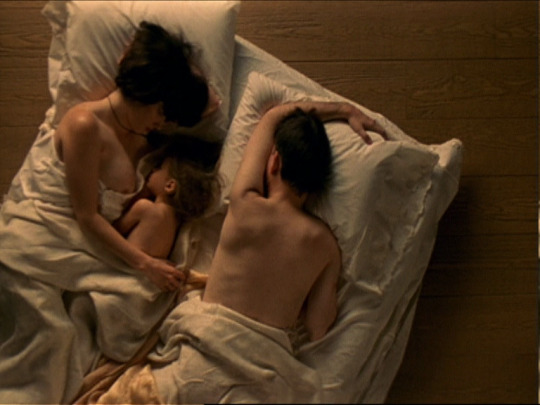
Notes:
[1] Atom Egoyan says this in the documentary Formulas for Seduction: the Cinema of Atom Egoyan (1999). The documentary, which is really weak as a whole (read: I am not recommending it), is available in the Artificial Eye Atom Egoyan Blu-Ray Box Set.
[2] See Dillon 2003, especially.
[3] May & Ferri 2002, 133-5.
[4] See Dillon 2003 and Weese 2002.
[5] Egoyan makes such a self-reflective observation in this interview.
[6] Dillon 2003, 228.
[7] Ibid. 227.
[8] Tarkovsky 1986, 121.
[9] Gruben 2007, 267.
[10] May & Ferri 2002, 132.
[11] Ibid. 133.
[12] Dillon 2003, 228.
[13] Gruben 2007, 271.
[14] May & Ferri 2002, 135-6.
[15] Weese 2002, 69.
[16] Gruben 2007, 249.
[17] Tarkovsky 1986, 119.
References:
Dillon, Steven. 2003. “Lyricism and accident in The ‘Sweet Hereafter’ (Russell Banks, Atom Egoyan)”. Literature-Film Quarterly 31(3), p. 227-230.
Gruben, Patricia. 2007. “Look but Don’t Touch: Visual and Tactile Desire in Exotica, The Sweet Hereafter, and Felicia’s Journey”. In Image and Territory: Essays on Atom Egoyan. Edited by Jennifer Lise Burwell and Monique Tschofen. Waterloo, Ont: WLU Press, p. 249-273.
May, Vivian M.; Ferri, Beth A. 2002. “’I’m a Wheelchair Girl Now’: Abjection, Intersectionality, and Subjectivity in Atom Egoyan’s ‘The Sweet Hereafter’”. Women’s Studies Quarterly, 30(1/2), 131-150.
Tarkovsky, Andrei. 1986. Sculpting in Time. Trans. Kitty Hunter-Blair. Austin, TX: University of Texas Press.
Weese, Katherine. 2002. "Family Stories: Gender and Discourse in Atom Egoyan's The Sweet Hereafter". Narrative, 10(1), p- 69-90.
6 notes
·
View notes
Text
alphabet thingy
i was tagged by @captaingrahamcr - thank you dear ^^
a - age: 31
b - biggest fear: death tbh
c - current time: 12:50
d - drink you last had: green tea
e - every day starts with: younger dog waking us up by pretending like she’s dying bc she wants her morning walk. every. morning.
f - favourite song: i got like a hundred faves. hmm. today it’s american dream by mkto. tomorrow it’ll probably be something else haha
g - ghosts, are they real: there’s a haunted abandoned insane asylum not far from here. sooooo yeah after visiting it i think ghosts are real
h - hometown: i live in virginia and that’s all y’all are gettin
i - in love with: billie piper’s smile, sense8 season 2, my OCs, people who don’t lie to me nor abandon me, pancakes
j - jealous of: a lot of things ugh
l - last time you cried: yesterday
m - middle name: michelle. i don’t feel like a michelle
n - number of siblings: ones i chose myself? several dozen
o - one wish: hmm i don’t wanna jinx it so i’ll keep it to myself for now
p - person you last called/texted: @ktrosesworld and i were just chatting about writing our fics
q - questions you’re always asked: "What are you?” bc i’m mixed race (*cringe* *twitch*), “How d’you get your hair to curl like that?” a fair question but again also bc i’m mixed race, “Where did you get [a piece of DW merch]?”
r - reasons to smile: david and billie working together on something again, i’m going to awesomecon next month, mr moony got his phd diploma after working for years to get it
s - song last sang: hmm i don’t really sing much. probably with mr moony in the car singin try everything by shakira
t - time you woke up: technically 8 AM, when younger dog apparently started dying as she’s wont to do
u - underwear colour: wonder woman XD
v - vacation destination: anywhere but the states will suffice i ain’t picky
w - worst habit: procrastinating
x - x-rays you’ve had: chest, wrists, spine
y - your favourite food: pancakes, s’mores, pasta, mac n cheese, fries, bread, strawberries, peaches, apples, pizza, ice cream, peanut butter, milk chocolate
z - zodiac sign: pisces
tagging: @aneclipsedhabitue, @dimensionhoppingrose, @onthedriftinthetardis, @thedeliriumtennants, @ktrosesworld, @gingergallifreyan, @veritascara, @dredshirtroberts, @parziivale, @the-sophia-75-smith, @wordsintimeandspace, @ofstormsandwolves
9 notes
·
View notes
Photo


ACEN AND MOTOR CITY COMIC CON ROUND UP
so last weekend was crazy, and it wore me down so much that i didn’t end up making this round up post until literally a week later oops
why was it so exhausting you ask because i did two cons in two totally different cities in one weekend
first up was ACEN,
acen is the big chicago anime con, and i am not exactly an anime fan (barely a video game one so i felt a bit out of place)
a few days before i had even posted on all social media being like “what can i make quick because i have nothing for this con” and my adorable friend anna said “jess be my emily” so here i am
this was a last min rush cosplay but it turned out cute and we got cute pics together so i am happy !
i ended up being late for the overwatch meet up though which was a little disappointing
also the overwatch meet up was the only place people recognized my cosplay, though i did get asked two times if i was supposed to be amy pond, so apparently all gingers are dr who now
i did have a pass (which i got for free from a photog friend!!) and explored the floor and stuff a bit, but honestly not being an anime fan made none of the con very enjoyable.
idk man people hyped acen up and it just... fell short
which is why it was a good thing the next day was motor city comic con
so this con is in detroit, which means we had a five hour drive there and a five hour drive back. thru the very unexciting parts of michigan
thankfully my car was super chill and we played some great car games like fuck, marry, kill dctv celebs and who can we make the most uncomfortable the fastest
they were good guys who as a bonus ! got me in free
(have i mentioned i love free cons??)
my selina kyle cosplay was recognized more than my emily though still not a whole lot, but it was comfy and that was what mattered
went to billie piper’s panel which was pretty cute and fun
ive determined wandering the floor is just not as fun when you have no money but getting to see cosplays from things i recognized was really nice
also i got a photoshoot of my cosplay and photos from that will be coming soon!
all in all motor city was just the more fun con for me, and def the one i will be doing next year if these happen to fall on the same weekend again
honestly, idk when my next con is?
maybe i’ll go to the ren faire!
1 note
·
View note